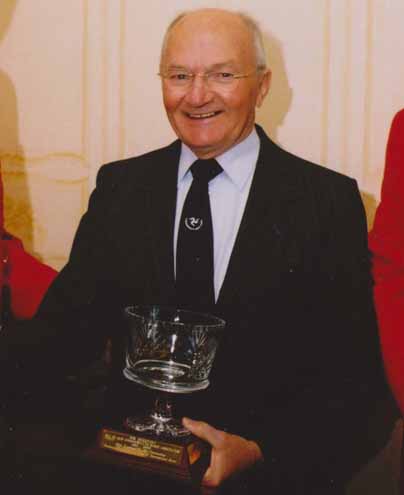This section contains known, published, newspaper articles about events that include Ron Killey. If you have knowledge of other articles not represented here,
and can share them, or know of additional information regarding the articles below, such as the identification of some of the individuals not
named, please let us know at:
| |
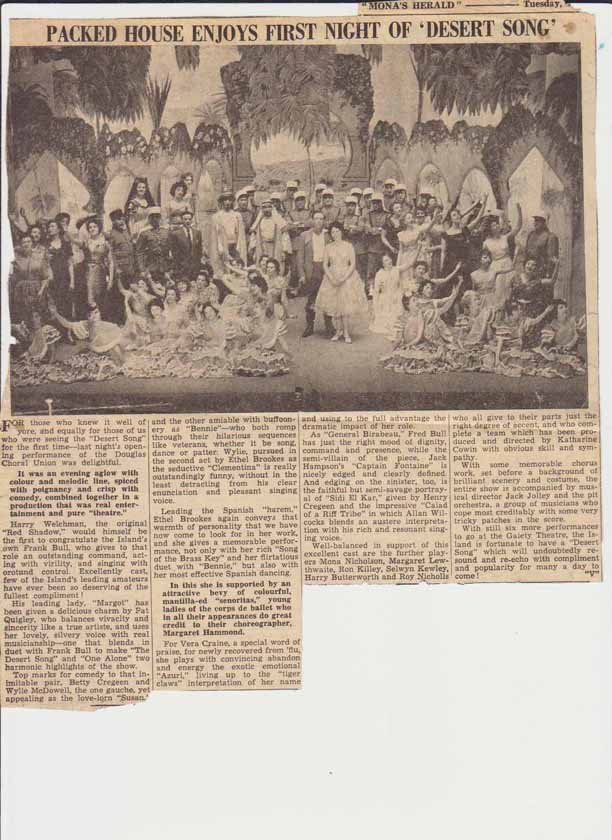
|
The Mona's Herald, 31 January 1961
Text: Packed House Enjoys First Night of 'Desert Song'.
For those who knew it well of yore, and equally for those of us who were seeing the 'Desert Song' for the first time
- last night's opening performance of the Douglas Choral Union was delightful.
It was an evening aglow with colour and melodic line, spiced with poignancy and crisp with comedy, combined together
in a production that was real entertainment and pure 'theatre'.
Harry Welchman, the original 'Red Shadow,' would himself be the first to congratulate the Island's own Frank Bull,
who gives to that role an outstanding command, acting with virility, and singing with orotund control.
Excellently cast, few of the Island's leading amateurs have ever been so deserving of the fullest complement!
His leading lady, 'Margot' has been given a delicious charm by Pat Quigley, who balances vivacity and sincerity
like a true atriste, and uses her lovely, silvery voice with real musicianship - one that blends in duet with
Frank Bull to make 'The Desert Song' and 'One Alone' two harmonic highights of the show.
Top marks for comedy to that imitable pair, Betty Cregeen and Wylie McDowell, the one gauche, yet appealing as the
love-lorn 'Susan,' and the other amiable with baffoonery as 'Bennie' - who both romp through their hilarious
sequences like veterans, whether it be song, dance or patter. Wylie, pursued in the second act by Ethel Brookes as
the seductive 'Clementina' is really outstandingly funny, without in the least detracting from his clear enunciation
and pleasant singing voice.
Leading the Spanish 'harem,' Ethel Brookes again conveys that warmth of personality that we have now come to look for
in her work, and she gives a memorable performance, not only with her rich 'Song of the Brass Key' and her flirtatious
duet with 'Bennie,' but also with her most effective Spanish dancing.
In this she is supported by an attractive bevy of colourful, mantilla-ed 'senioritas,' young ladies of the corps de
ballet who in all their apperances do great credit to their choreographer, Margaret Hammond.
For Vera Craine, a special word of praise, for newly recovered from 'flu, she plays with convincing abandon and energy
the exotic emotional 'Azuri,' living up to the 'tiger claws' interpretation of her name and using to the full advantage
the dramatic impact of her role.
As 'General Birabeau,' Fred Bull has just the right mood of dignity, command and presence, while the semi-villain of
the piece, Jack Hampson's 'Captain Fontaine' is nicely edged and clearly defined. And edging on the sinister, too,
is the faithful but semi-savage portrayal of 'Sidi El Kar,' given by Henry Cregeen and the impressive 'Caiad of a Riff
Tribe' in which Allan Wilcocks blends an austere interpretation with his rich and resonant singing voice.
Well-balanced in support of this excellent cast are the further players Mona Nicholson, Margaret Lewthwaite,
Ron Killey, Selwyn Kewley, Harry Butterworth and Roy Nicholls who all give to their parts just the right degree of
accent, and who complete a team which has been produced and directed by Katherine COwin with obvious skill and sympathy.
With some memorable chorus work, set before a background of brilliant scenery and costume, the entire show is
accompanied by musical director Jack Jolley and the pit orchestra, a group of musicians who cope most creditably with
some very tricky patches in the score.
With still six more performances to go at the Gaiety Theatre, the Island is fortunate to have a 'Desert Song' which
will undoubtedly resound and re-echo with compliment and popularity for many a day to come. 'V'.
|
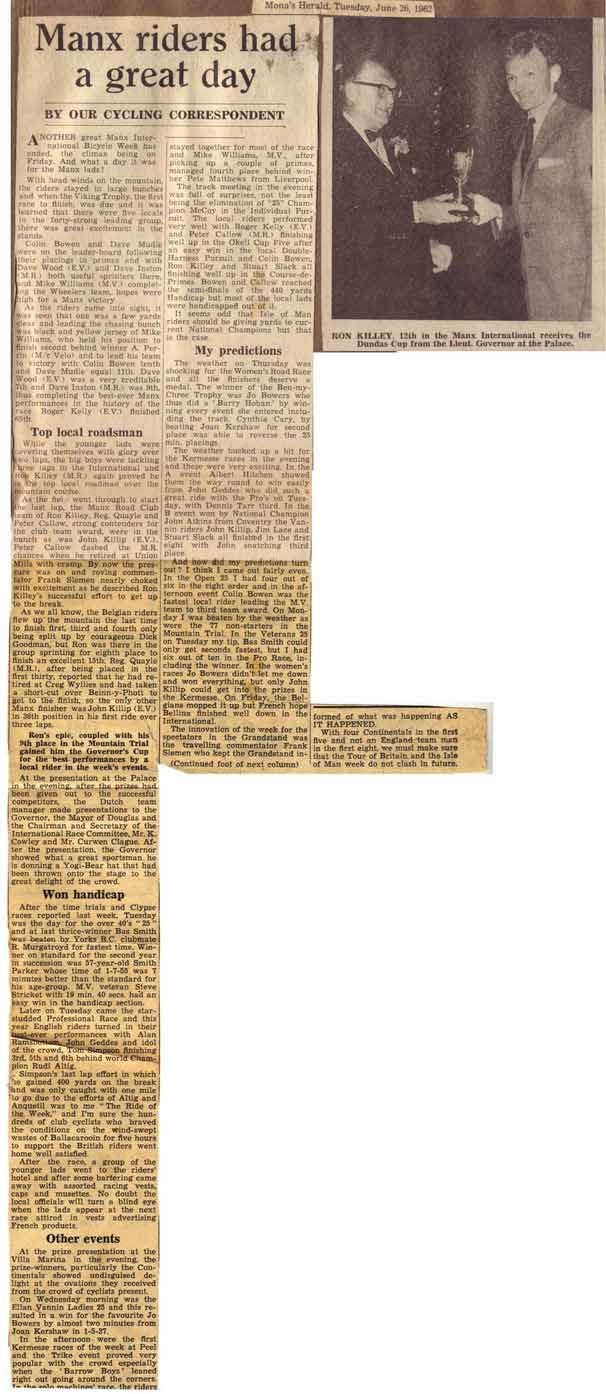
|
The Mona's Herald, 26 June 1962
Text: Manx riders had a great day
By Our Cycling Correspondent
Another great Manx International Bicycle Week has ended, the climax being on Friday. And what a day it was for the
Manx lads!
With head winds on the mountain, the riders stayed in large bunches and when the Viking Trophy, the first race to
finish, was due and it was learned that there were five locals in the forty-strong leading group, there was great
excitement in the stands.
Colin Bowen and Dave Mudie were on the leader-board following their placings in primes and with Dave Wood (E.V.) and
Dave Inston (M.R.) both useful sprinters there, and Mike Williams (M.V.) completing the Wheelers team, hopes were high
for a Manx victory.
As the riders came into sight, it was seen that one was a few yards clear and leading the chasing bunch was black and
yellow jersey of Mike Williams, who held his position to finish second behind winner A. Perrin (M/c Velo) and to lead
his team to victory with Colin Bowen tenth and Dave Mudie equal 11th. Dave Wood (E.V.) was a very creditable 7th and
Dave Inston (M.R.) was 9th, thus completing the best-ever Manx performances in the history of the race. Roger Kelly
(E.V.) finished 65th.
Top local roadsman
While the younger lads were covering themselves with glory over two laps, the big boys were tackling three laps in the
International and Ron Killey (M.R.) again proved he is the top local roadsman over the mountain course.
As the field went through to start the last lap, the Manx Road Club team of Ron Killey, Reg. Quayle and Peter Callow,
strong contenders for the club team award, were in the bunch as was John Killip (E.V.). Peter Callow dashed the M.R.
chances when he retired at Union Mills with cramp. By now the pressure was on and roving commentator Frank Siemen
nearly choked with excitement as he described Ron Killey's successful effort to get up to the break.
As we all know, the Belgian riders flew up the mountain the last time to finish first, third and fourth only being
split up by courageous Dick Goodman, but Ron was there in the group sprinting for eighth place to finish an excellent
15th. Reg. Quayle (M.R.), after being placed in the first thirty, reported that he had retired at Creg Wyllies and
had taken a short-cut over Beinn-y-Phott to get to the finish, so the only other Manx finisher was John Killip (E.V.)
in 36th position in his first ride over three laps.
Ron's epic, coupled with his 9th place in the Mountain Trial gained him the Governor's Cup for best performances by
a local rider in the week's events.
At the presentation at the Palace in the evening, after the prizes had been given out to the successful competitors,
the Dutch team manager made presentations to the Governor, the Mayor of Douglas and the Chairman and Secretary of the
International Race Committee, Mr. K. Cowley and Mr. Curwen Clague. After the presentation, the Governor showed what
a great sportsman he is donning a Yogi-Bear hat that had been thrown onto the stage to the great delight of the crowd.
Won Handicap
After the time trials and Clypse races reported last week, Tuesday was the day for the 40's "25" and at last
thrice-winner Bas Smith was beaten by Yorks R.C. clubmate R. Murgatroyd for fastest time. Winner on standard for the
second year in succession was 57-year-old Smith Parker whose time of 1-7-55 was 7 minutes better than the standard
for his age-group. M.V. veteran Steve Stricket with 19 min. 40 secs. had an easy win in the handicap section.
Later on Tuesday came the star-studded Professional Race and this year English riders turned in their best-ever
performances with Alan Ramsbottom, John Geddes and idol of the crowd, Tom Simpson finishing 3rd, 5th and 6th behind
world Champion Rudi Altig.
Simpson's last lap effort in which he gained 400 yards on the break and was only caught with one mile to go due to the
efforts of Altig and Anquetil was to me "The Ride of the Week," and I'm sure the hundreds of club cyclists who braved
the conditions on the wind-swept wastes of Ballacarooin for five hours to support the British riders went home well
satisfied.
After the race, a group of the younger lads went to the riders' hotel and after some bartering came away with assorted
racing vests, caps and musettes. No doubt the local officials will turn a blind eye when the lads appear at the next
race attired in vests advertising French products.
Other events
At the prize presentation at the Villa Marina in the evening, the prize-winners, particularly the Continentals showed
undisguised delight at the ovations they received from the crowd of cyclists present.
On Wednesday morning was the Ellan Vannin Ladies 25 and this resulted in a win for the favourite Jo Bowers by almost
two minutes from Joan Kershaw in 1-5-37.
In the afternoon were the first Kermesse races of the week at Peel and the Trike event proved very popular with the
crowd especially with the 'Barrow Boys' leaned right out going around the corners. In the solo machines' race the
riders stayed together for most of the race and Mike Williams, M.V., after picking up a couple of primes, managed
fourth place behind winner Pete Matthews from Liverpool.
The track meeting in the evening was full of surprises, not the least being the elimination of "25" Champion McCoy
in the Individual Pursuit The local riders performed very well with Roger Kelly (E.V.) and Peter Callow (M.R.)
finishing well up in the Okell Cup Five after an easy win in the local Double-Harness Pursuit and Colin Bowin,
Ron Killey and Stuart Slack all finishing well up in the Course-de-Primes. Bowen and Callow reached the semi-finals
of the 440 yards Handicap but most of the local lads were handicapped out of it.
It seems odd that Isle of Man riders should be giving yards to current National Champions but that is the case.
My predictions
The weather on Thursday was shocking for the Women's Road Race and all the finishers deserve a medal. The winner of
the Ben-my-Chree Trophy was Jo Bowers who thus did a 'Barry Hoban' by winning every event she entered including the
track. Cynthia Cary, by beating Joan Kershaw for second place was able to reverse the 25min. placings.
The weather bucked up a bit for the Kermesse races in the evening and these were very exciting. In the A event
Albert Hitchen showed them the way round to win easily from John Geddes who did such a great ride with the Pro's on
Tuesday, with Dennis Tarr third. In the B event won by National Champion John Atkins from Coventry the Vannin riders
John Killip, Jim Lace and Stuart Slack all finished in the first eight with John snatching third place.
And how did my predictions turn out? I think I came out fairly even. In the Open 25 I had four out of six in the
right order and in the afternoon event Colin Bowen was the fastest local rider leading the M.V. team to third team
award. On Monday I was beaten by the weather as were the 77 non-starters in the Mountain Trial. In the Veterans 25
on Tuesday my tip, Bas Smith could only get seconds faster, but I had six out of ten in the Pro Race, including the
winner. In the women's races Jo Bowers didn't let me down and won everything, but only John Killip could get into the
prizes in the Kermesse. On Friday, the Belgians mopped it up but French hope Bellina finished well down in the
International.
The innovation of the week for the spectators in the Grandstand was the travelling commentator Frank Siemen who kept
the Grandstand informed of what was happening As It Happened.
With four Continentals in the first five and not an English team man in the first eight, we must make sure that the
Tour of Britain and the Isle of Man week do not clash in future.
Picture caption: Ron Killey, 12th in the Manx International receives the Dundas Cup from the Lieut. Governor
at the Palace.
Note: the article has Ron finishing 15th in the Manx International, not 12th. Also confusingly, Ron is documented
as having won the Dundas cup for best local rider of Cycling Week in 1956, when he finished 10th, although of course he
could have been a winner of the cup in multiple years.
|
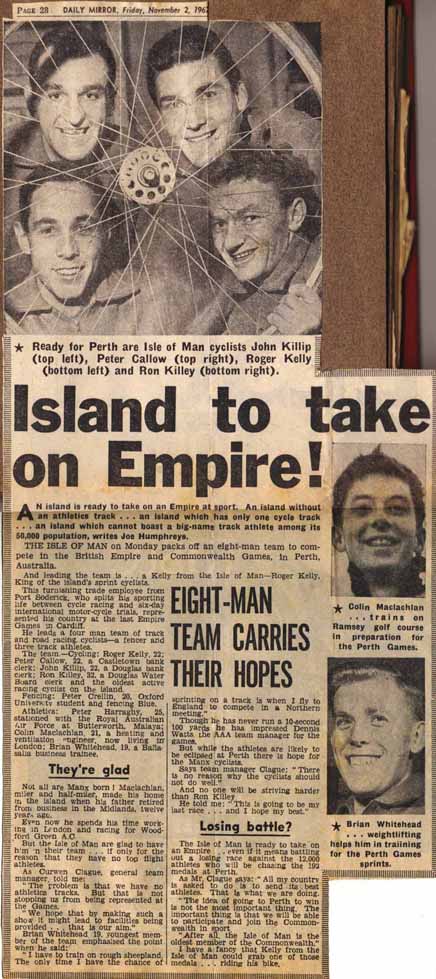
|
The Daily Mirror, 2 November 1962
Text: Island to take on Empire!
Subheading, middle of page: Eight-Man Team Carries Their Hopes
An island is ready to take on an Empire at sport. An island without an althetes track ... an island which has only one
cycle track ... an island which cannot boast a big-name track athlete among its 50,000 population, write Joe Humphreys.
The Isle of Man on Monday packs off an eight-man team to compete in the British Empire and Commonwealth Games, in
Perth, Australia.
And leading the team is ... a Kelly from the Isle of Man - Roger Kelly, King of the island's sprint cyclists.
This furnishing trade employee from Port Soderick, who splits his sporting life between cycle racing and six-day
international motor-cycle trials, represented his country at the last Empire Games in Cardiff.
He leads a four man team of track and road racing cyclists - a fencer and three track athletes.
The team - Cycling: Roger Kelly, 22; Peter Callow, 22, a Castletown bank clerk; John Killip, 22, a Douglas bank clerk;
Ron Killey, 32, a Douglas Water Board clerk and the oldest active racing cyclist on the island.
Fencing: Peter Crellin, 20, Oxford University student and fencing Blue.
Athletics: Peter Harraghy, 25, stationed with the Royal Australian Air Force at Butterworth, Malaya; Colin Maclachlan,
21, a heating and ventilation engineer, now living in London; Brian Whitehead, 19, a Ballasalla business trainee.
They're glad
Not all are Manx born! Maclachlan, miler and half-miler, made his home in the island when his father retired from
business in the Midlands, twelve years ago.
Even now he spends his time working in London and racing for Woodford Green A.C.
But the Isle of Man are glad to have him on their team ... if only for the reason that they have no top flight athletes.
As Curwen Clague, general team manager, told me:
"The problem is that we have no athletics tracks. But that is not stopping us from being represented at the Games.
"We hope that by making such a show it might lead to facilities being provided ... that is our aim."
Brian Whitehead, 19, youngest member of the team emphasised the point when he said:
"I have to train on rough sheepland. The only time I have the chance of sprinting on a track is when I fly to England
to compete in a Northern meeting."
Though he has never run a 10-second 100 yards he has impressed Dennis Watts, the AAA team manager for the games.
But while the athletes are likely to be eclipsed at Perth there is hope for the Manx cyclists.
Says team manager Clague: "There is no reason why the cyclists should not do well."
And no one will be striving harder than Ron Killey.
He told me: "This is going to be my last race ... and I hope my best."
Losing battle?
The Isle of Man is ready to take on an Empire ... even if it means battling out a losing race against the 12,000
athletes [Note: 1,200 athletes and officials were expected to participate in the 1962 Games] who will be chasing
the 192 medals at Perth.
As Mr. Clague says: "All my country is asked to do is to send its best athletes. That is what we are doing.
"The idea of going to Perth to win is not the most important thing. The important thing is that we will be able to
participate and join the Commonwealth in sport.
"After all, the Isle of Man is the oldest member of the Commonwealth."
I have a fancy that Kelly from the Isle of Man could grab one of those medals ... riding his bike.
Picture caption, top: * Ready for Perth are Isle of Man cyclists John Killip (top left), Peter Callow (top
right), Roger Kelly (bottom left) and Ron Killey (bottom right).
Picture caption, middle-right: * Colin Maclachlan ... trains on Ramsey golf course in preparation for the
Perth Games.
Picture caption, bottom-right: * Brian Whitehead ... weightlifting helps him in training for the Perth Games
sprints.
|
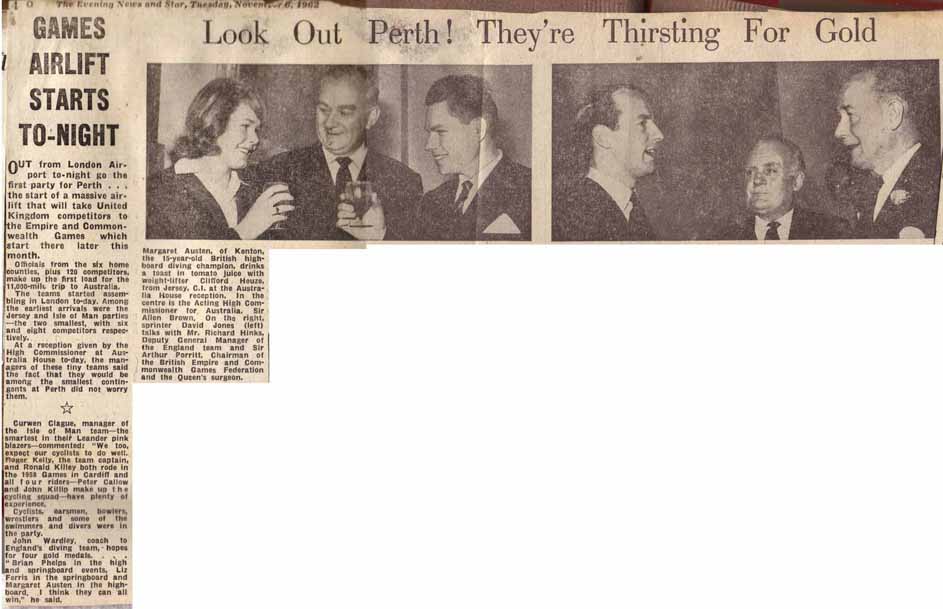
|
The Evening News and Star, 6 November 1962
Text: Look Out Perth! They're Thirsting For Gold
Games Airlift Start To-Night
Out from London Airport to-night go the first party for Perth ... the start of a massive airlift that will take United
Kingdom competitors to the Empire and Commonwealth Games which start there later this month.
Officials from the six home counties, plus 120 competitors, make up the first load for the 11,000-mile trip to
Australia.
The teams started assembling in London to-day. Among the earliest arrivals were the Jersey and Isle of Man parties -
the two smallest, with six and eight competitors respectively.
At a reception given by the High Commissioner at Australia House to-day, the managers of these tiny teams said the
fact that they would be among the smallest contingents at Perth did not worry them.
Curwen Clague, manager of the Isle of Man team - the smartest in their Leander pink blazers - commented: "We too,
expect our cyclists to do well. Roger Kelly, the team captain, and Ronald Killey both rode in the 1958 Games in Cardiff
and all four riders - Peter Callow and John Killip make up the cycling squad - have plenty of experience.
Cyclists, oarsmen, bowlers, wrestlers and some of the swimmers and divers were in the party.
John Wardley, coach to England's diving team, hopes for four gold medals. ... "Brian Phelps in the high and springboard
events, Liz Ferris in the springboard and Margaret Austen in the highboard. I think they can all win," he said.
Picture caption: Margaret Austen, of Kenton, the 15-year-old British highboard diving champion, drinks a toast
in tomato juice with weight-lifter Clifford Heuze, from Jersey, C.I. at the Australia House reception. In the center
is the Acting High Commissioner for Australia, Sir Allen Brown. On the right, sprinter David Jones (left) talks with
Mr. Richard Hinks, Deputy General Manager of the England team and Sir Arthur Porritt, Chairman of the British Empire
and Commonwealth Games Federation and the Queen's surgeon.
|

|
The Isle of Man Daily Times, 6 November 1962
Text: Spotlight on Male Fashions ....
Eight Smart Men for Perth
Manx Team's New Wardrobe for Commonwealth Games
Eight very smart men left Ronaldsway Airport yesterday afternoon. They were seven of the eight members of the Manx
team leaving, with their manager Curwen Clague, to take part in the British Empire and Commonwealth Games at Perth.
Whilst regretting there were no women in the team so that I could have featured the feminine fashions, the men
nevertheless more than merit a fashion feature of their own.
The Manx Goverment have contributed to their equipment, but the Isle of Man Tourist Board and local firms have assisted
greatly in designing, fitting and supplying everything required.
Naturally the 24 hour flight by B.O.A.C./Quantas to Perth necessitates "travelling light". The weather when they arrive
will be warm and sunny - and all the teams taking part will arrive in their own individual team uniforms.
The Manx team's outfits have been carried out in a colour scheme of red, white and gold.
For the initial ceremonial opening and on all ceremonial occasions the team will wear pork pie panama hats (which won't
lose their shape), with red ribbon round the crown. With white flannels, white shirt and team tie they will wear a red
blazer of terylene and linen mixture, piped thinly with gold, with the pockets carrying the special crest. Both tie and
crest have been designed by Norman Howell. The silk tie is grey and has a red stripe bordered with gold and white. The
crest has the Three Legs and the date. Brown suede shoes complete the ceremonial dress.
In adition [sic] the team carry a pale fawn plastic mackintosh, grey flannels for general wear, white
long-sleeved sweater, three sets of underwear and white peaked sun hats (to be worn compulsorily on medical advice).
The cyclist members of the team (John Killip, Peter Callow, Roger Kelly and Ron Killey) have white caps with red and
gold flashes and white silk vests with sleeves and necks edged in red and gold.
The track suits for all the Manx competitors are red with the name Isle of Man blazoned in white across the back and
crested pockets. The competition vests for the athletes (Peter Harraghy, Colin Maclachlan and Brian Whitehead) are
white with red and gold chest bands. Fencer Peter Crellin will have an all-white fencing outfit.
The Tourist Board have supplied the team with pin lapel badges of the Three Legs of Man sumounted by the Manx cat -
and the team have a plentiful supply to give away as souvenirs to other competitors at the Games. They also carry a
supply of Manx cat badges to give away to general souvenir hunters who are always a feature of these occasions.
Manx pennants, made specially, will be presented to each of the 36 team managers at the Games together with a Manx
crested ball point pen.
Kitting out the team - in a manner befitting such an occasion - has naturally entailed a lot of thought, planning and
trouble. Wherever possible the clothes and equipment have been obtained locally.
Messrs Fred Bridson have been responsible for obtaining the ties and blazers; Cowley's Sports Shop the track suits and
competition vests; hats, flannels, sweaters, shirts and macks by Lays; Esquire, the Lyle and Scott underwear; True-Form
the shoes, and Downwards the Coco-Cola passport and travel document wallets of red.
For the past month Horlicks have supplied all team members with an ample supply of their product which will continue
throughout the period of the Games.
Team member Peter Harraghy, serving with the R.A.F. in Malaya, joins the team in Perth. His measurements for his
uniform were taken by the R.A.F. tailor out there and sent home. His kit will be taken to him by Mr Clague.
In Perth
In Perth our Manx team will live, with all the 1,200 athletes taking part, in a fenced off new housing estate situated
in a park. The houses are new bungalows costing between £4,000 and £5,000 each. It is expected that the Manx team will
be together in one bungalow. They will eat in the central dining hall (free of charge), cafeteria style, and the menus
are out of this world - anything one wants and in any quantity.
On this estate - which is stuated [sic] ¼-mile from the Indian Ocean near City Beach - there will be a free
laundry service provided by Hoover, free make and mend repair service, a bank and post office and an after-hours
restaurant where the athletes can entertain outside friends. There will be a big recreation hall and an out-of-door
cinema.
During their stay in Perth, every participant in the Games will be a honorary member of the City Beach Swimming and
Surf Club and the residents of Perth are giving free private transport, supplying car and driver to wherever the
athlete might want to go. All public transport will be free for the period!
The Manx team will be in Perth for three weeks. We shall be thinking of them, envying them - and wishing them the very
best of luck!
|
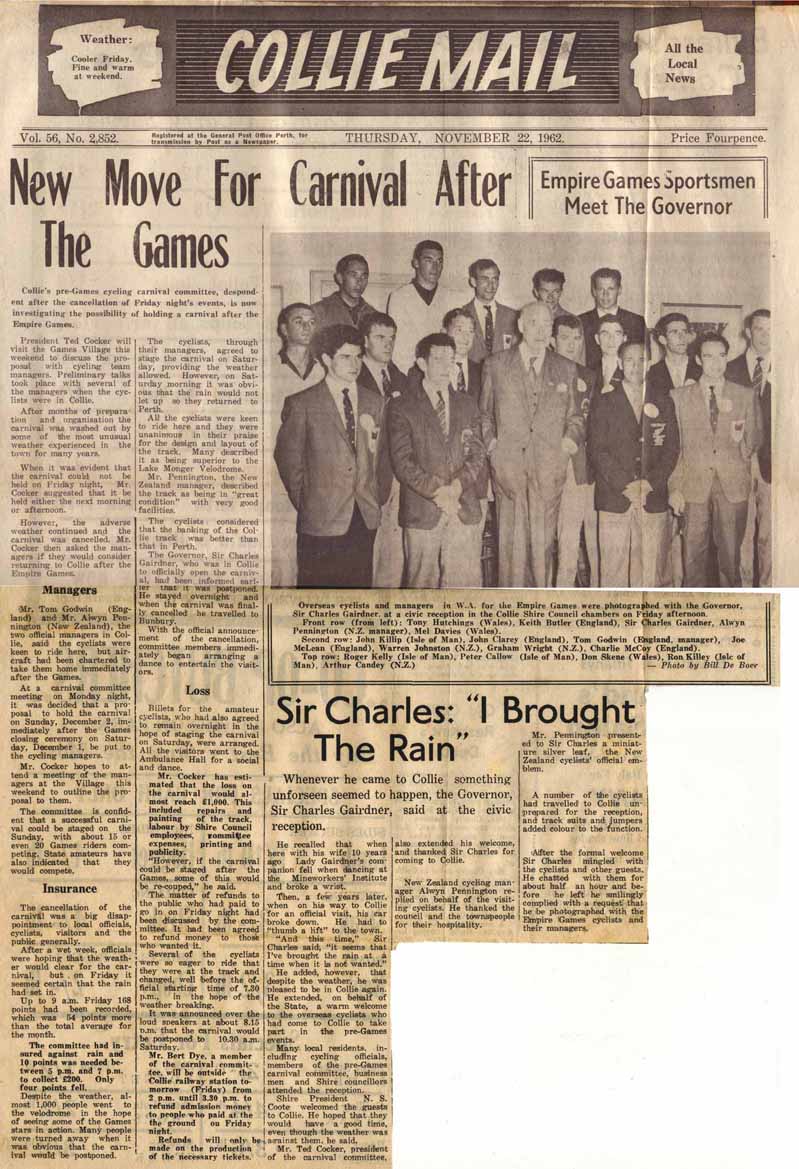
|
The Collie Mail (Australia), 22 November 1962
Text: New Move For Carnival After The Games
Collie's pre-Games cycling carnival committee, despondent after the cancellation of Friday night's events, is now
investigating the possibility of holding a carnival after the Empire Games.
President Ted Cocker will visit the Games Village this weekend to discuss the proposal with cycling team managers.
Preliminary talks took place with several of the managers when the cyclists were in Collie.
After months of preparation and organisation the carnival was washed out by some of the most unusual weather
experienced in the town for many years.
When it was evident the carnival could not be held on Friday night, Mr. Cocker suggested that it be held either the
next morning or afternoon.
However, the adverse weather continued and the carnival was cancelled. Mr. Cocker then asked the managers if they
would consider returning to Collie after the Empire Games.
Managers
Mr. Tom Goodwin (England) and Mr. Alwyn Pennington (New Zealand), the twp official managers in Collie, said the
cyclists were keen to ride here, but aircraft had been chartered to take them home immediately after the Games.
At a carnival committee meeting on Monday night, it was decided that a proposal to hold the carnival on Sunday,
December 2, immediately after the Games closing ceremony on Saturday, December 1, be put to the cycling managers.
Mr. Cocker hopes to attend a meeting of the managers at the Village this weekend to outline the proposal to them.
The committee is confident that a successful carnival could be staged on the Sunday, with about 15 or even 20 Games
riders competing. State amateurs have alo indicated that they would compete.
Insurance
The cancellation of the carnival was a big disappointment to local officials, cyclists, visitors and the public
generally.
After a wet week, officials were hoping that the weather would clear for the carnival, but on Friday it seemed certain
that the rain had set in.
Up to 9 a.m. Friday 168 points had been recorded, which was 54 points more than the total average for the month.
The committee had insured against rain and 10 points was needed between 5 p.m. and 7 p.m. to collect £200. Only four
points fell.
Despite the weather, almost a 1,000 people went to the velodrome in the hope of seeing some of the Games stars in
action. Many people were turned away when it was obvious that the carnival would be postponed.
The cyclists, through their managers, agreed to stage the carnival on Saturday, provided the weather allowed. However,
on Saturday morning it was obvious that the rain would not let up so they returned to Perth.
All the cyclists were keen to ride here and they were unanimous in their praise for the design and layout of the track.
Many described it as being superior to the Lake Monger Velodrome.
Mr. Pennington, the New Zealand manager, described the track as being in "great condition" with very good facilities.
The cyclists considered that the banking of the Collie track was better than that in Perth.
The Governor, Sir Charles Gairdner, who was in Collie to officially open the carnival, had been informed earlier that
it was postponed. He stayed overnight and when the carnival was finally cancelled he travelled to Banbury.
With the official announcement of the cancellation, committee members immediately began arranging a dance to entertain
the visitors.
Loss
Billets for the amateur cyclists, who had also agreed to remain overnight in the hope of staging the carnival on
Saturday, were arranged. All the visitors went to the Ambulance Hall for a social and dance.
Mr. Cocker has estimated that the loss on the carnival would almost reach £1,000. This included repairs and painting
of the track, labour by Shire Council employees, committee expenses, printing and publicity.
"However, if the carnival could be staged after the Games, some of this would be re-couped," he said.
The matter of refunds to the public who had paid to go in on Friday night had been discussed by the committee. It had
been agreed to refund money to those who wanted it.
Several of the cyclists were so eager to ride that they were at the track and changed, well before the official
starting time of 7.30 p.m., in the hope of the weather breaking.
It was announced over the loud speakers at about 8.15 p.m. that the carnival would be postponed to 10.30 a.m. Saturday.
Mr. Bert Dye, a member of the carnival committee, will be outside the Collie railway station tomorrow (Friday) from
2 p.m. until 3.30 p.m. to refund admission money to people who paid at the ground on Friday night.
Refund will only be made on the production of the necessary tickets.
Sir Charles: "I Brought The Rain"
Whenever he came to Collie something unforseen seemed to happen, the Governor, Sir Charles Gairdner, said at the civic
reception.
He recalled that when here with his wife 10 years ago Lady Gairdner's companion fell when dancing at the Mineworkers'
Institute and broke a wrist.
Then, a few years later, when on his way to Collie for an official visit, his car broke down. He had to "thumb a lift"
to the town.
"And this time," Sir Charles said, "it seemed that I've brought the rain at a time when it is not wanted."
He added, however, that despite the weather, he was pleased to be in Collie again. He extended, on behalf of the State,
a warm welcome to the overseas cyclists who had come to Collie to take part in the pre-Games events.
Many local residents, including cycling officials, members of the pre-Games carnival committee, business men and Shire
councillors attended the reception.
Shire President N. s. Coote welcomed the guests to Collie. He hoped that they would have a good time, even though the
weather was against them, he said.
Mr. Ted Cocker, president of the carnival committee, also extended his welcome, and thanked Sir Charles for coming to
Collie.
New Zealand cycling manager Alwyn Pennington replied on behalf of the visiting cyclists. He thanked the council and the
townspeople for their hospitality.
Mr. Pennington presented to Sir Charles a miniature silver leaf, the New Zealand cyclists' official emblem.
A number of the cyclists had travelled to Collie unprepared for the reception, and track suits and jumpers added colour
to the function.
After the formal welcome Sir Charles mingled with the cyclists and other guests. He chatted with them for about half an
hour and before he left he smilingly complied with a request that he be photographed with the Empire Games cyclists and
their managers.
Picture heading: Empire Games Sportsmen Meet The Governor
Picture caption: Overseas cyclists and managers in W.A. for the Empire Games were photographed with the
Governor, Sir Charles Gairdner, at a civic reception in the Collie Shire Council chambers on Friday afternoon.
Front row (from left): Tony Hutchings (Wales), Keith Butler (England), Sir Charles Gairdner, Alwyn Pennington (N.Z.
manager), Mel Davies (Wales).
Second row: John Killip (Isle of Man), John Clarey (England), Tom Godwin (England, manager), Joe McLean (England),
Warren Johnston (N.Z.), Graham Wright (N.Z.), Charlie McCoy (England).
Top row: Roger Kelly (Isle of Man), Peter Callow (Isle of Man), Don Skene (Wales), Ron Killey (Isle of Man),
Arthur Candey (N.Z.)
- Photo by Bill De Boer
|
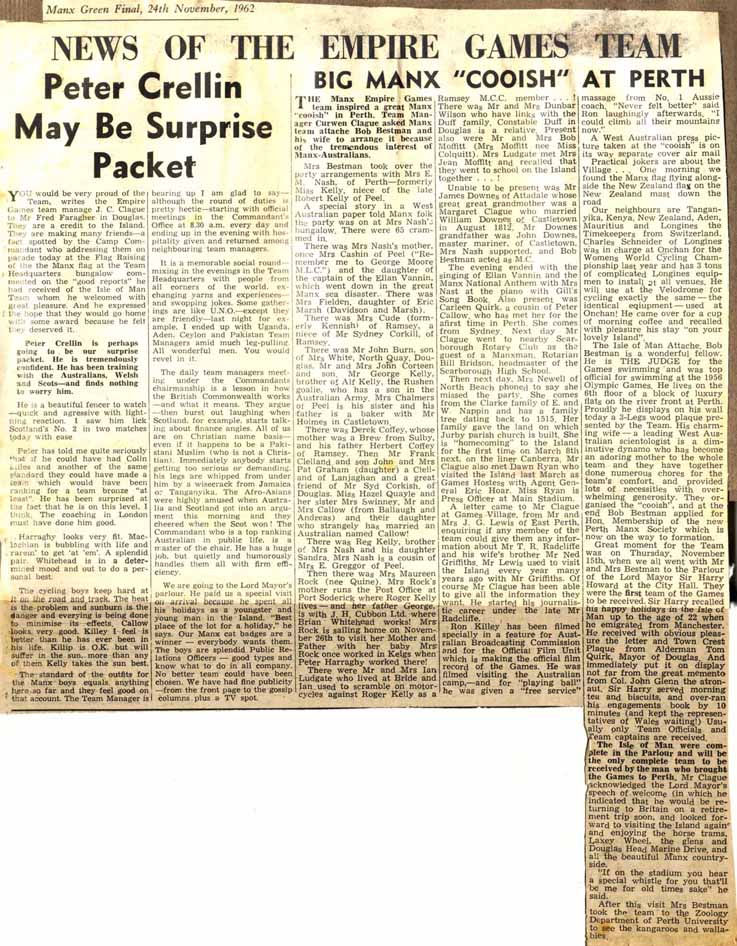
|
The Manx Green Final, 24 November 1962
Text: News Of The Empire Games Team
Peter Crellin May Be Surprise Packet
You would be very proud of the Team, writes the Empire Games team manage [sic] J. C. Clague to Mr Fred Faragher
in Douglas. They are a credit to the Island. They are making many friends - a fact spotted by the Camp Commandant who
addressing them on parade today at the Flag Raising of the Manx flag at the Team Headquarters bungalow commented on the
"good reports" he had received of the Isle of Man Team whom he welcomed with great pleasure. And he expressed the hope
that they would go home with some award because he felt they deserved it.
Peter Crellin is perhaps going to be our surprise packet. He is tremendously confident. He has been training with the
Australians, Welsh and Scots - and finds nothing to worry him.
He is a beautiful fencer to watch - quick and aggressive with lightning reaction. I saw him lick Scotland's No. 2 in
two matches today with ease.
Peter has told me quite seriously that if he could have had Colin Miles and another of the same standard they could
have made a team which would have been ranking for a team bronze "at least". He has been surprised at the fact that he
is on this level, I think. The coaching in London must have done him good.
Harraghy looks very fit. Maclachlan is bubbling with life and rarein' to get 'at 'em'. A splendid pair. Whitehead is
in a determined mood and out to do a personal best.
The cycling boys keep hard at it on the road and track. The heat is the problem and sunburn is the danger and
everything is being done to minimize its effects. Callow looks very good. Killey I feel is better than he has ever been
in his life. Killip is O.K. but will suffer in the sun, more than any of them Kelly takes the sun best.
The standard of outfits for the Manx boys equals anything here so far and they feel good on that account. The Team
Manager is bearing up I am glad to say - although the round of duties is pretty hectic - starting with official
meetings in the Commandant's Office at 8:30 a.m. every day and ending up in the evening with hospitality given and
returned among neighbouring team managers.
It is a memorable social round - mixing in the evenings in the Team Headquarters with people from all corners of the
world, exchanging yarns and experiences - and swopping jokes. Some gathering are like U.N.O. - except they are friendly
- last night for example, I ended up with Uganda, Aden, Ceylon and Pakistan Team Managers amid much leg-pulling. All
wonderful men. You would revel in it.
The daily team managers meeting under the Commandants chairmanship is a lesson in how the British Commonwealth works
- and what it means. They argue - then burst out laughing when Scotland, for example, starts talking about finance
angles. All of us are on Christian name basis - even if it happens to be a Pakastani Muslim (who is not a Christian).
Immediately anybody starts getting too serious or demanding, his legs are whipped from under him by a wisecrack from
Jamaica or Tanganyika. The Afro-Asians were highly amused when Australia and Scotland got into an agrument this morning
and they cheered when the Scot won! The Commandant who is a top ranking Australian in public life, is a master of the
chair. He has a huge job, but quietly and humorously handles them all with firm efficiency.
We are going to the Lord Mayor's parlour. He paid us a special visit on arrival because he spent all his holidays as a
youngster and young man in the Island. "Best place of the lot for a holiday," he says. Ou Manx cat badges are a winner
- everybody wants them. The boys are splendid Public Relations Officers - good types and know what to do in all
company. No better team could have been chosen. We have had fine publicity - from the front page of the gossip columns
plus a TV spot.
Big Manx "Cooish" At Perth
The Manx Empire Games team inspired a great Manx "cooish" in Perth. Team Manager Curwin Clague asked Manx team attache
Bob Bestman and his wife to arrange it because of the tremendous interest of Manx-Australians.
Mrs Bestman took over the party arrangements with Mrs E. M. Nash, of Perth - formerly Miss Kelly, neice of the late
Robert Kelly of Peel.
A special story in a West Australian paper told Manx folk the party was on at Mrs Nash's bungalow. There were 65
crammed in.
There was Mrs Nash's mother, one Mrs Cashin of Peel ("Remember me to George Moore M.L.C.") and the daughter of the
captain of the Ellan Vannin, which went down in the great Manx sea disaster. There was Mrs Fielden, daughter of
Eric Marsh (Davidson and Marsh).
There was Mrs Cude (formerly Kennish) of Ramsey, a neice of Mr Sydney Corkill, of Ramsey.
There was Mr John Burn, son of Mrs White, North Quay, Douglas, Mr and Mrs John Corteen and son. Mr George Kelly,
brother of Alf Kelly, the Rushen goalie, who has a son in the Australian Army. Mrs Chalmers of Peel is his sister and
his father is a baker with Mr Holmes in Castletown.
There was Derek Coffey, whose mother was a Brew from Sulby, and his father Herbert Coffey of Ramsey. Then
Mr Frank Clelland and son John and Mrs Pat Graham (daughter) a Clelland of Lanjaghan and a great friend of
Mr Syd Corkish, of Douglas. Miss Hazel Quayle and her sisters Mrs Swinney, Mr and Mrs Callow (from Ballaugh and
Andreas) and their daughter who strangely has married an Australian named Callow!
There was Reg Kelly, brother of Mrs Nash and his daughter Sandra. Mrs Nash is a cousin of Mrs E. Greggor of Peel.
Then there was Mrs Maureen Rock (nee Quine). Mrs Rock's mother runs the Post Office at Port Soderick where Roger Kelly
lives - and her father George, is with J. H. Cubbon Ltd. where Brian Whitehead works! Mrs Rock is sailing home on
November 26th to visit her Mother and Father with her baby Mrs Rock once worked in Keigs when Peter Harraghy worked
there!
There were Mr and Mrs Ian Ludgate who lived at Bride and Ian used to scramble on motorcycles against Roger Kelly as a
Ramsey M.C.C. member...! There was Mr and Mrs Dunbar Wilson who have links with the Duff family. Constable Duff in
Douglas is a relative. Present also were Mr and Mrs Bob Moffitt (Mrs Moffitt nee Miss Colquitt). Mrs Ludgate met
Mrs Jean Moffatt and recalled that they went to school on the Island together...!
Unable to be present was Mr James Downes of Attadale whose great great grandmother was a Margaret Clague who married
William Downes of Castletown in August 1812. Mr Downes grandfather was John Downes, master mariner, of Castletown.
Mrs Nash supported, and Bob Bestman acted as M.C.
The evening ended with the singing of Ellan Vannin and the Manx National Anthem with Mrs Nast at the piano with
Gill's Song Book. Also present was Carleen Quirk, a cousin of Peter Callow, who has met her for the afirst [sic]
time in Perth. She comes from Sydney. Next day Mr Clague went to nearby Scarborough Rotary Club as the guest of a
Manxman. Rotarian Bill Bridson, headmaster of the Scarborough High School.
Then next day, Mrs Newell of North Beach phoned to say she missed the party. She comes from the Clarke family of
E. and W. Nappin and has a family tree dating back to 1515. Her family gave the land on which Jurby parish church is
built. She is "homecoming" to the Island for the first time on March 8th next, on the liner Canberra. Mr Clague also
met Dawn Ryan who visited the Island last March as Games Hostess with Agent General Eric Hoar. Miss Ryan is Press
Officer at Main Stadium.
A letter came to Mr Clague at Games Village, from Mr and Mrs J. G. Lewis of East Perth, enquiring if any member of the
team could give them any information about Mr T. R. Radcliffe and his wife's brother Mr Ned Griffiths. Mr Lewis used to
visit the Island every year many years ago with Mr Griffiths. Of course Mr Clague has been able to give all the
information they want. He started his journalistic career under the late Mr Radcliffe.
Ron Killey has been filmed specially in a feature for Australian Broadcasting Commission and for the Official Film Unit
which is making the official film record of the Games. He was filmed visiting the Australian camp, - and for "playing
ball" he was given a "free service" massage from No. 1 Aussie coach. "Never felt better" said Ron laughingly
afterwards. "I could climb all their mountain now."
A West Australian press picture taken at the "cooish" is on its way separate cover air mail
Practical jokers are about the Village ... One morning we found the Manx flag flying alongside the New Zealand flag on
the New Zealand mast down the road
Our neighbours are Tanganyika, Kenya, New Zealand, Aden, Mauritius and Longines the Timekeepers from Switzerland.
Charles Schneider of Longines was in charge at Onchan for the Womens World Cycling Championship last year and has 3
tons of complicated Longines equipment to install at all venues. He will use at the Velodrome for cycling exactly the
same - the identical equipment - used at Onchan! He came over for a cup of morning coffee and recalled with pleasure
his stay "on your lovely Island".
The Isle of Man Attache, Bob Bestman is a wonderful fellow. He is The Judge for the Games swimming and was top official
for swimming at the 1956 Olympic Games. He lives on the 6th floor of a block of luxury flats on the river front at
Perth. Proudly he displays on his wall today a 3-Legs wood plaque presented by the Team. His charming wife - a leading
West Australian scientologist is a diminutive dynamo who has become an adoring mother to the whole team and they have
together done numerous chores for the team's comfort, and provided lots of necessities with overwhelming generosity.
They organised the "cooish", and at the end Bob Bestman applied for Hon. Membership of the new Perth Manx Society which
is now on the way to formation.
Great moment for the Team was on Thursday, November 15th, when we all went with Mr and Mrs Bestman to the Parlour of
the Lord Mayor Sir Harry Howard at the City Hall. They were the first team of the Games to be received. Sir Harry
recalled his happy holidays in the Isle of Man up to the age of 22 when he emigrated from Manchester. He received with
obvious pleasure the letter and Town Crest Plaque from Alderman Tom Quirk, Mayor of Douglas. And immediately put it on
display not far from the great momento from Col. John Glenn the astronaut. Sir Harry served morning tea and biscuits,
and over-ran his engagements book by 10 minutes (and kept the representatives of Wales waiting!) Usually only Team
Officials and Team captains are received.
The Isle of Man were complete in the Parlour and will be the only complete team to be received by the man who brought
the Games to Perth. Mr Clague acknowledged the Lord Mayor's speech of welcome (in which he indicated that he would be
returning to Britain on a retirement trip soon, and looked forward to visiting the Island again and enjoying the horse
trams, Laxey Wheel, the glens and Douglas Head Marine Drive, and all the beautiful Manx countryside.
"If on the stadium you hear a special whistle for you that'll be me for old times sake" he said.
After this visit Mr Bestman took the team to the Zoology Department of Perth University to see the kangaroos and
whallabies.
|
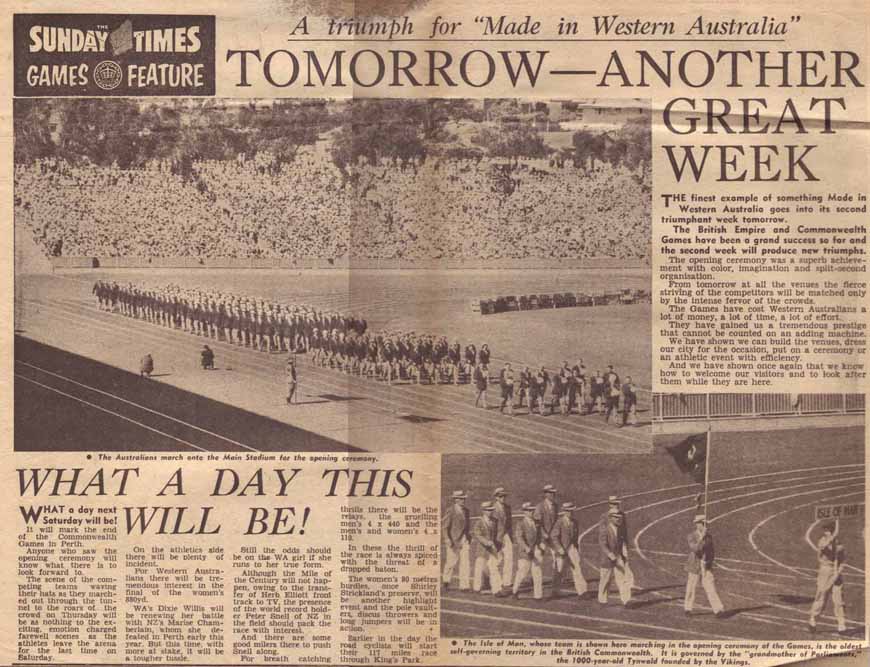
|
The Sunday Times (Australia), 25 November 1962
Text: A triumph for "Made in Western Australia"
Tomorrow - Another Great Week
The finest example of something Made in Western Austrlia goes into its second triumphant week tomorrow.
The British Empire and Commonwealth Games have been a grand success so far and the second week will produce new
triumphs.
The opening ceremony was a superb achievement with color, imagination and split-second organisation.
From tomorrow at all the venues the fierce striving of the competitors will be matched only by the intense fervor of
the crowds.
The Games have cost Western Australians a lot of money, a lot of time, a lot of effort.
They have gained us a tremendous prestige that cannot be counted on an adding machine.
We have shown we can build the venues, dress our city for the occasion, put on a ceremony or an athletic even with
efficiency.
And we have shown once again that we know how to welcome our visitors and to look after them while they are here.
What A Day This Will Be!
What a day next Saturday will be!
It will mark the end of the Commonwealth Games in Perth.
Anyone who saw the opening ceremony will know what there is to look forward to.
The scene of the competing teams waving their hats as they marched out through the tunnel to the roars of the crowd on
Thursday will be as nothing to the exciting, emotion charged farewell scenes as the athletes leave the arena for the
last time on Saturday.
On the athletics side there will be plenty of incident.
For Western Australians there will be a tremendous interest in the final of the women's 880yd.
WA's Dixie Willis will be renewing her battle with NZ's Marise Chamberlain, whom she defeated in Perth early this year.
But this time, with more at stake, it will be a tougher tussle.
Still the odds should be on the WA girl if she runs to her true form.
Although the Mile of the Century will not happen, owing to the transfer of Herb Elliott from track to TV, the presence
of the world record holder Peter Snell of NZ in the field should pack the race with interest.
And there are some good milers there to push Snell along.
For breath catching thrills there will be the relays, the gruelling men's 4 x 400 and the men's and women's 4 x 110.
In these the thrill of the race is always spiced with the threat of a dropped baton.
The women's 80 metres hurdles, once Shirley Strickland's preserve, will be another highlight event and the pole
vaulters, discus throwers and long jumpers will be in action.
Earlier in the day the road cyclists will start their 117 miles race through King's Park.
Top picture caption: The Australians march onto the Main Stadium for the opening ceremony.
Bottom picture caption: The Isle of Man, whose team is shown here marching in the opening ceremony of the Games,
is the oldest self-governing territory in the British Commonwealth. It is governed by the "grandmother of Parliaments,"
the 1000-year-old Tynwald founded by the Vikings.
Picture note: The flag bearer for the Isle of Man is Roger Kelly; behind him is Team Manager, Curwen Clague;
then, partially obscured by Clague is an unknown althete; and next in line is Ron Killey.
|
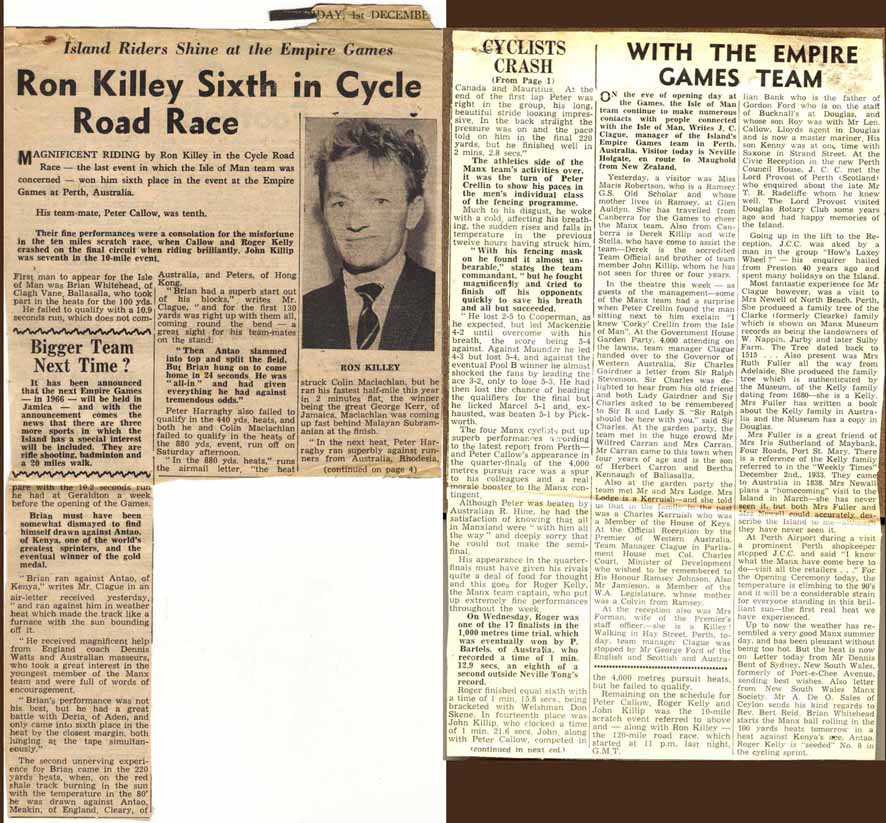
|
The Manx Green Final, 1 December 1962
Text: Island Riders Shine at the Empire Games
Ron Killey Sixth in Cycle Road Race
Magnificent riding by Ron Killey in the Cycle Road Race - the last event in which the Isle of Man team was concerned -
won him sixth place in the event at the Empire Games at Perth, Australia.
His team-mate, Peter Callow, was tenth.
Their fine performances were a consolation for the misfortune in the ten miles scratch race, when Callow and
Roger Kelly crashed on the final circuit when riding brilliantly. John Killip was seventh in the 10-mile event.
First man to appear for the Isle of Man was Brian Whitehead, of Clagh Vane, Ballasalla, who took part in the heats for
the 100 yds.
He failed to qualify with a 10.9 seconds run, which does not compare with the 10.2 seconds run he had at Geraldton a
week before the opening of the Games.
Brian must have been somewhat dismayed to find himself drawn against Antao, of Kenya, one of the world's greatest
sprinters, and the eventual winner of the gold medal.
"Brian ran against Antao, of Kenya," writes Mr. Clague in an air-letter received yesterday, "and ran against him in
weather heat which made the track like a furnace with the sun bounding off it.
"He received magnificent help from England coach Dennis Watts and Australian masseurs, who took a great interest in the
youngest member of the Manx team and were full of words of encouragement.
"Brian's performance was not his best, but he had a great battle with Deria, of Aden, and only came into sixth place in
the heat by the closest margin, both lunging at the tape simultaneously.
The second unnerving experience for Brian came in the 220 yards heats, when, on the red shale track burning in the sun
with temperatures in the 80' he was drawn against Anteo, Meakin, of England, Cleary, of Australia, and Peters, of
Hong Kong.
"Brian had a superb start out of his blocks," writes Mr. Clague, "and for the first 130 yards was right up with them
all, coming round the bend - a great sight for his team-mates on the stand.
"Then Anteo slammed into top and split the field. But Brian hung on to come home in 24 seconds. He was "all-in" and had
given everything he had against tremendous odds."
Peter Harraghy also failed to qualify in the 440 yds. heats, and both he and Colin Maclachlan failed to qualify in the
heats of the 880 yds. event, run off on Saturday afternoon.
"In the 880 yds. heats," runs the airmail letter, "the heat struck Colin Maclachlan, but he ran his fastest half-mile
this year in 2 minutes flat, the winner being the great George Kerr, of Jamaica, Maclachlan was coming up fast behind
Malayan Subramanian at the finish.
"In the next heat, Peter Harraghy ran suberbly against runners from Australia, Rhodesia, (continued on page 4)
Cyclists Crash (From Page 1)
Canada and Mauritius. At the end of the first lap Peter was right in the group, his long, beautiful stride looking
impressive. In the back straight the pressure was on and the pace told on him in the final 220 yards, but he finished
well in 2 mins. 2.8 secs."
The athetics side of the Manx team's activities over, it was the turn of Peter Crellin to show his paces in the men's
individual class of the fencing programme.
Much to his disgust, he woke with a cold, affecting his breathing, the sudden rises and falls in tempurature in the
previous twelve hours having struck him.
"with his fencing mask on he found it almost unbearable," states the team commandant, "but he fought magnificently and
tried to finish off his opponents quickly to save his breath and all but succeeded.
"He lost 2-5 to Cooperman, as he expected, but let Mackenzie 4-2 until overcome with his breath, the score being 5-4
against. Against Maunder he led 4-3 but lost 5-4, and against the eventual Pool B winner he almost shocked the fans by
leading the ace 3-2, only to lose 5-3. He had then lost the chance of heading the qualifiers for the final but he
licked Marcel 5-1 and, exhausted, was beaten 5-1 by Pickworth.
The four Manx cyclists put up superb performances according to the latest report from Perth - and Peter Callow's
appearance in the quarter-finals of the 4,000 metres pursuit race was a sput to his colleagues and a real morale
booster to the Manx contingent.
Although Peter was beaten by Australian R. Hine, he had the satisfaction of knowing that all in Manxland were "with him
all the way" and deeply sorry that he could not make the semi-final.
His appearance in the quarter-finals must have given his rivals quite a deal of food for thought and this goes for
Roger Kelly, the Manx team captain, who put up extremely fine performances throughout the week.
On Wednesday, Roger was one of the 17 finalists in the 1,000 metres time trial, which was eventually won by P. Bartels,
of Australia, who recorded a time of 1 min. 12.9 secs. an eighth of a second outside Neville Tong's record.
Roger finished equal sixth with a time of 1 min. 15.8 secs., being bracketed with Welshman Don Skene. In fourteenth
place was John Killip, who clocked a time of 1 min. 21.6 secs. John, along with Peter Callow, competed in (continued in
next col)
the 4,000 metres pursuit heats, but he failed to qualify.
Remaining on the schedule for Peter Callow, Roger Kelly and John Killip was the 10-mile scratch event referred to above
and - along with Ron Killey - the 120-mile road race, which started at 11 p.m. last night, G.M.T.
Inset: Bigger Team Next Time?
It has been announced that the next Empire Games - in 1966 - will be held in Jamica [sic] - and with the
announcement comes the news that there are three more sports in which the Island has a special interest will be
included. They are rifle shooting, badminton and a 20 miles walk.
Picture caption: Ron Killey.
|
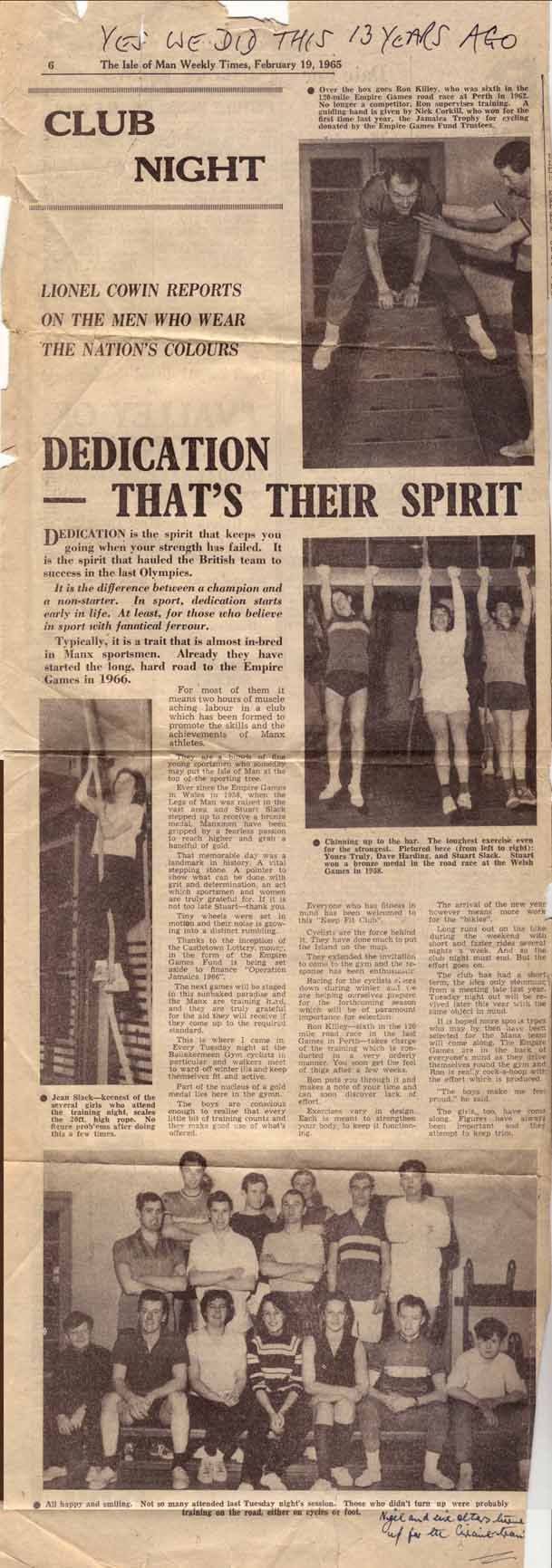
|
The Weekly Times, 19 February 1965
Text: Club Night
Lionel Cowin Reports On The Men Who Wear The Nation's Colours
Dedication - That's Their Spirit
Dedication is the spirit that keeps you going when your strength has failed. It is the spirit that hauled the
British team to success in the last Olympics.
It is the difference between a champion and a non-starter. In sport, dedication starts early in life. At least,
for those who believe in sport with fanatical fervour.
Typically, it is a trait that is almost in-bred in Manx sportsmen. Already they have started the long, hard road
to the Empire Games in 1966.
For most of them it means two hours of muscle aching labour in a club which has been formed to promote the skills
and the achievements of Manx athletes.
They are a bunch of fine young sportsmen who someday may put the Isle of Man at the top of the sporting tree.
Ever since the Empire Games in Wales in 1958, when the Legs of Man was raised in the vast area and Stuart Slack
stepped up to receive a bronze medal, Manxmen have been gripped by a fearless passion to reach higher and grab
a handful of gold.
That memorable day was a landmark in history. A vital stepping stone. A pointer to show what can be done with
grit and determination, an act which sportsmen and women are truly grateful for. If it is not too late Stuart
- thank you.
Tiny wheels were set in motion and their noise is growing into a distinct rumble.
Thanks to the inception of the Castletown Lottery, money, in the form of the Empire Games Fund is being set aside
to finance "Operation Jamaica 1966".
The next games will be staged in this sunbaked paradise and the Manx are training hard, and they are truly grateful
for the aid they will receive if they come up to the required standard.
This is where I came in. Every Tuesday night at the Ballakermeen Gym cyclists in particular and walkers meet to
ward off winter ills and keep themselves fit and active.
Part of the nucleus of a gold medal lies here in the gymn.
The boys are conscious enough to realize that every little bit of training counts and they make good use of what's
offered.
Everyone who has fitness in mind has been welcomed to this "Keep Fit Club".
Cyclists are the force behind it. They have done much to put the Island on the map.
They extended the invitation to come to the gym and the response has been enthusiastic.
Racing for the cyclists closes down during the winter and we are helping ourselves prepare for the forthcoming
season which will be of paramount importance for selection.
Ron Killey - sixth in the 120 mile road race in the last Games in Perth - takes charge of the training which is
conducted in a very orderly manner. You soon get the feel of thigs [sic] after a few weeks.
Ron puts you through it and makes a note of your time and can soon discover lack of effort.
Exercises vary in design. Each is meant to strengthen your body, to keep it functioning.
The arrival of the new year however means more work for the "bikies".
Long runs out on the bike during the weekend with short and faster rides several nights a week. And so the club
night must end. But the effort goes on.
The club has had a short term, the idea only stemming from a meeting late last year. Tuesday night out will be
revived later this year with the same object in mind.
It is hoped more sports types who may by then have been selected for the Manx team will come along. The Empire
Games are in the back of everyone's mind as they drive themselves round the gym and Ron is really cock-a-hoop
with the effort which is produced.
"The boys make me feel proud," he said.
The girls, too, have come along. Figures have always been important and they attempt to keep trim.
Picture caption (top): Over the box goes Ron Killey, who was sixth in the 120-mile Empire Games road race
at Perth in 1962. No longer a competitor, Ron supervises training. A guiding hand is given by Nick Corkill, who
won for the first time last year, the Jamaica Trophy for cycling donated by the Empire Games Fund Trustees.
Picture caption (right): Chinning up to the bar. The toughest exercise even for the strongest. Pictured
here (from left to right): Yours Truly, Dave Harding, and Stuart Slack. Stuart won a bronze medal in the road
race at the Welsh Games in 1958.
Picture caption (left): Jean Slack - keenest of the several girls who attend the training night, scales
the 20ft. high rope. No figure problems after doing this a few times.
Picture caption (bottom): All happy and smiling. Not so many attended last Tuesday night's session. Those
who didn't turn up were probably training on the road, either on cycles or foot.
Picture note (bottom): Ron is in the bottom row, second from the right.
|
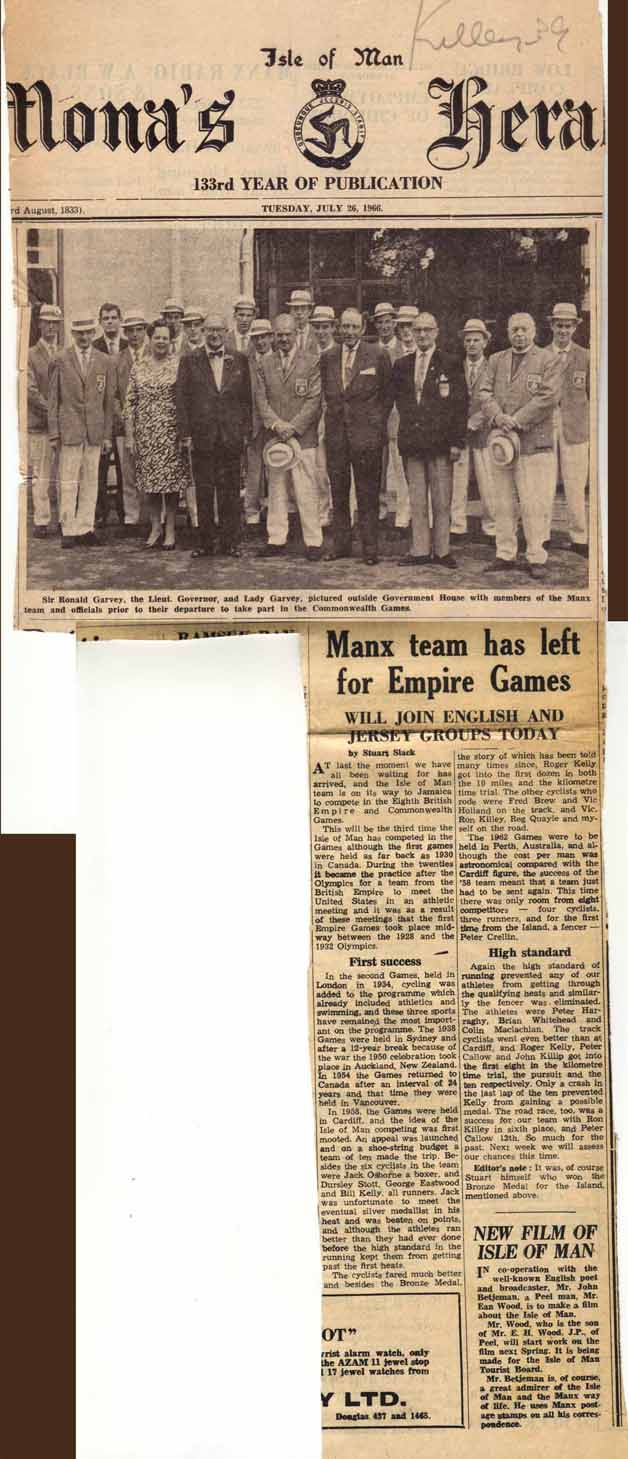
|
The Mona's Herald, 26 July 1966
Text: Manx team has left for Empire Games
Will Join English And Jersey Groups Today
by Stuart Slack
At last the moment we have all been waiting for has arrived, and the Isle of Man team is on its way to Jamaica
to compete in the Eighth British Empire and Commonwealth Games.
This will be the third time the Isle of Man has competed in the Games although the first games were held as far
back as 1930 in Canada. During the twenties it became the practice after the Olympics for a team from the British
Empire to meet the United States in an athletic meeting and it was as a result of these meetings that the first
Empire Games took place midway between the 1928 and the 1932 Olympics.
First success
In the second Games, held in London in 1934, cycling was added to the programme which already included athletics
and swimming, and these three sports have remained the most important on the programme. The 1938 Games were held
in Sydney and after a 12-year break because of the war the 1950 celebration took place in Auckland, New Zealand.
In 1954 the Games returned to Canada after an interval of 24 years and that time they were held in Vancouver.
In 1958, the Games were held in Cardiff, and the idea of the Isle of Man competing was first mooted. An appeal
was launched and on a shoe-string budget a team of ten made the trip. Besides the six cyclists in the team were
Jack Osborne a boxer, and Dursley Stott, George Eastwood and Bill Kelly, all runners. Jack was unfortunate to
meet the eventual silver medallist in his heat and was beaten on points, and although the athletes ran better
than they had ever done before the high standard in the running kept them from getting past the first heats.
The cyclists fared much better and besides the Bronze Medal, the story of which has been told many times since,
Roger Kelly got into the first dozen in both the 10 miles and the kilometre time trial. The other cyclists who
rode were Fred Brew and Vic Holland on the track, and Vic, Ron Killey, Reg Quayle and myself on the road.
The 1962 Games were to be held in Perth, Australia, and although the cost per man was astronomical compared with
the Cardiff figure, the success of the '58 team meant that a team just had to be sent again. This time there was
only room for eight competitors - four cyclists, three runners, and for the first time from the Island, a fencer
- Peter Crellin.
High standard
Again the high standard of running prevented any of our athletes from getting through the qualifying heats and
similarly the fencer was eliminated. The athletes were Peter Harraghy, Brian Whitehead and Colin Maclachlan. The
track cyclists went even better than at Cardiff, and Roger Kelly, Peter Callow and John Killip got into the first
eight in the kilometre time trial, the pursuit and the ten respectively. Only a crash in the last lap of the ten
prevented Kelly from gaining a possible medal. The road race, too, was a success for our team with Ron Killey in
sixth place, and Peter Callow 12th. So much for the past. Next week we will assess our chances this time.
Editor's note: It was, of course Stuart himself who won the Bronze Medal for the Island, mentioned above.
Picture caption (top): Sir Ronald Garvey, the Lieut. Governor, and Lady Garvey, pictured outside Government
House with members of the Manx team and officials prior to their departure to take part in the Commonwealth Games.
Picture note: Ron is second from left.
|
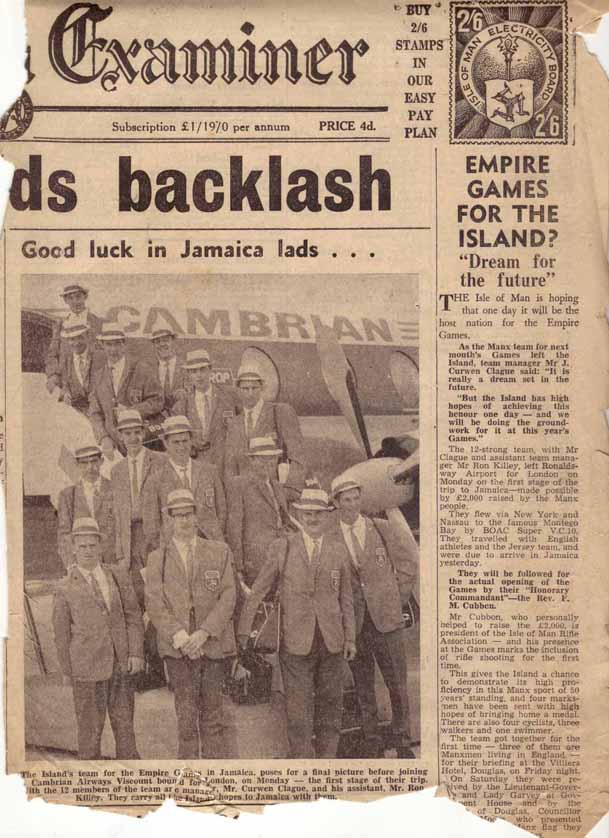
|
Isle of Man Examiner, 28 July 1966
Text: Good luck in Jamaica lads ...
Picture caption: The Island's team for the Empire Games in Jamaica, poses for a final picture before
joining a Cambrian Airways Viscount bound for London, on Monday - the first stage of their trip.
With the 12 members of the team are manager, Mr. Curwen Clague, and his assistant, Mr. Ron Killey. They carry
all the Island's hopes to Jamaica with them.
Text: Empire Games For The Island?
"Dream for the future"
The Isle of Man is hoping that one day it will be a host nation for the Empire Games.
As the Manx team for next month's Games left the Island, team manager Mr J. Curwen Clague said: "It is really
a dream set in the future.
"But the Island has high hopes of achieving this honour one day - and we will be doing the groundwork for it at
this year's Games."
The 12-strong team, with Mr Clague and assistant team manager Mr Ron Killey, left Ronaldsway Airport for London
on Monday on the first stage of the trip to Jamaica - made possible by £2,000 raised by the Manx people.
They flew via New York and Nassau to the famous Montego Bay by BOAC Super V.C.10. They travelled with English
athletes and the Jersey team, and were due to arrive in Jamaica yesterday.
They will be followed for the actual opening of the Games by their "Honorary Commandant" - the Rev. F. M. Cubben.
Mr Cubbon, who personally helped to raise the £2,000, is president of the Isle of Man Rifle Association - and
his presence at the Games marks the inclusion of rifle shooting for the first time.
This gives the Island a chance to demonstrate its high proficiency in this Manx sport of 50 years' standing, and
four marksmen have been sent with high hopes of bringing home a medal. There are also four cyclists, three
walkers and one swimmer.
The team got together for the first time - three of them are Manxmen living in England - for their briefing at
the Villiers Hotel, Douglas, on Friday night.
On Saturday they were received by the Lieutentant-Governor and Lady Garvey at Goverment House and by the
[missing text] of Douglas, Councillor [missing text] who presented [missing text] Manx flag
they [missing text]
|
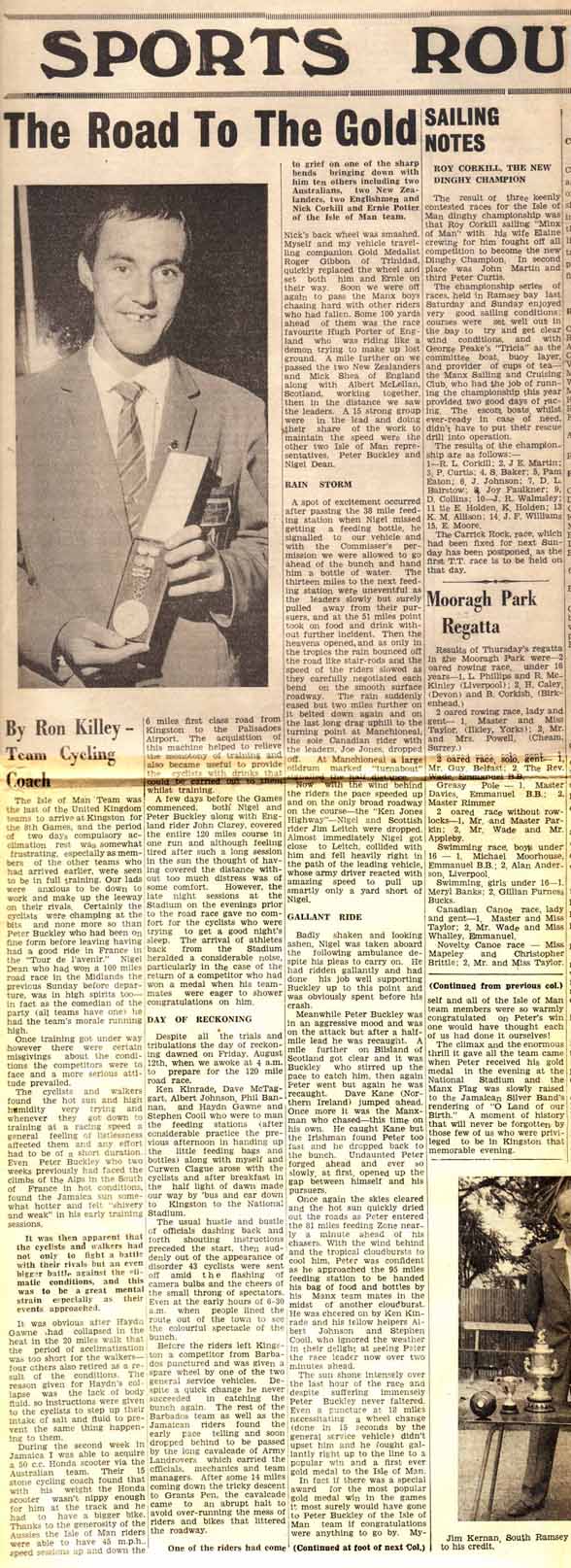
|
The Isle of Man Courier, 26 August 1966
Text: The Road To The Gold
By Ron Killey - Team Cycling Coach
The Isle of Man Team was the last of the United Kingdom teams to arrive at Kingston for the 8th Games, and the
period of two days compulsory acclimation rest was somewhat frustrating, especially as members of the other teams
who had arrived earlier, were seen to be in full training. Our lads were anxious to be down to work and make up
the leeway on their rivals. Certainly the cyclists were champing at the bits and none more so than Peter Buckley
who had been on fine form before leaving having had a good ride in France in the "Tour de l'avenir." Nigel Dean
who had won a 100 miles road race in the Midlands the previous Sunday before departure, was in high spirits too
- in fact as the comedian of the party (all teams have one) he had the team's morale running high.
Once training got under way however there were certain misgivings about the conditions the competitors were to
face and a more serious attitude prevailed.
The cyclists and walkers found the hot sun and high humidity very trying and whenever they got down to training
at a racing speed a general feeling of listlessness affected them and any effort had to be of a short duration.
Even Peter Buckley who two weeks previously had faced the climbs of the Alps in the South of France in hot
conditions, found the Jamaica sun somewhat hotter and felt "shivery and weak" in his early training sessions.
It was then apparent that the cyclists and walkers had not only to fight a battle with their rivals but an even
bigger battle against the climatic conditions, and this was to be a great mental strain especially as their events
approached.
It was obvious after Haydn Gawne had collapsed in the heat in the 20 miles walk that the period of acclimatization
was too short for the walkers - four others also retired as a result of the conditions. The reason given for
Haydn's collapse was lack of body fluid, so instructions were given to the cyclists to step up their intake of
salt and fluid to prevent the same thing happening to them.
During the second week in Jamaica I was able to acquire a 50 c.c. Honda scooter via the Australian team. Their
15 stone cycling coach found that with his weight the Honda scooter wasn't nippy enough for him at the track and
he had to have a bigger bike. Thanks to the generosity of the Aussies the Isle of Man riders were able to have
45 m.p.h. speed sessions up and down the 6 miles first class road from Kingston to the Palisadoes Airport. The
acquisition of this machine helped to relieve the monotony of training and also became useful to provide the
cyclists with drinks that would be carried out to them whilst training.
A few days before the Games commenced, both Nigel and Peter Buckley along with England rider John Clarey, covered
the entire 120 miles course in one run and although feeling tired after such a long session in the sun the thought
of having covered the distance without too much distress was of some comfort. However, the late night sessions at
the Stadium on the evenings prior to the road race gave no comfort for the cyclists who were trying to get a good
night's sleep. The arrival of athletes back from the Stadium heralded a considerable noise, particularly in the
case of the return of a competitor who had won a medal when his teammates were eager to shower congratulations
on him.
Day Of Reckoning
Despite all the trials and tribulations the day of reckoning dawned on Friday, August 12th, when we woke at 4 a.m.
to prepare for the 120 mile road race.
Ken Kinrade, Dave McTaggart, Albert Johnson, Phil Bannan, and Haydn Gawne and Stephen Cooil who were to man the
feeding stations (after considerable practice the previous afternoon in handing up the little feeding bags and
bottles) along with myself and Curwen Clague arose with the cyclists and after breakfast in the half light of
dawn made our way by 'bus and car down to Kingston to the National Stadium.
The usual hustle and bustle of officials dashing back and forth shouting instructions preceded the start, then
suddenly out of the appearance of disorder 43 cyclists were sent off amid the flashing of camera bulbs and the
cheers of the small throng of spectators. Even at the early hours of 6-30 a.m. when people lined the route out
of the town to see the colourful spectacle of the bunch.
Before the riders left Kingston a competitor from Barbados punctured and was given a spare wheel by one of the
two general service vehicles. Despite a quick change he never succeeded in catching the bunch again. The rest of
the Barbados team as well as the Jamaican riders found the early pace telling and soon dropped behind to be passed
by the long cavalcade of Army Landrovers which carried the officials, mechanics and team managers. After some 14
miles coming down the tricky descent to Grants Pen, the cavalcade came to an abrupt halt to avoid over-running the
mess of riders and bikes that littered the roadway.
One of the riders had come to grief on one of the sharp bends bringing down with him ten others including two
Australians, two New Zealanders, two Englishmen and Nick Corkill and Ernie Potter of the Isle of Man team.
Nick's back wheel was smashed. Myself and my vehicle travelling companion Gold Medalist Roger Gibbon of Trinidad,
quickly replaced the wheel and set both him and Ernie on their way. Soon we were off again to pass the Manx boys
chasing hard with other riders who had fallen. Some 100 yards ahead of them was the race favourite Hugh Porter of
England who was riding like a demon trying to make up lost ground. A mile further on we passed the two New
Zealanders and Mike Shea of England along with Albert McLellan, Scotland, working together, then in the distance
we saw the leaders. A 15 strong group were in the lead and doing their share of the work to maintain the speed
were the other two Isle of Man representatives, Peter Buckley and Nigel Dean.
Rain Storm
A spot of excitement occurred after passing the 38 mile feeding station when Nigel missed getting a feeding bottle,
he signalled to our vehicle and with the Commissioner's permission we were allowed to go ahead of the bunch and
hand him a bottle of water. The thirteen miles to the next feeding station were uneventful as the leaders slowly
but surely pulled away from their pursuers, and at the 51 mile point took on food and drink without further
incident. Then the heavens opened, and as only in the tropics the rain bounced off the road like stair-rods and
the speed of the riders slowed as they carefully negotiated each bend on the smooth surface roadway. The rain
suddenly eased but two miles further on it belted down again and on the last long drag uphill to the turning
point at Manchioneal, the sole Canadian rider with the leaders, Joe Jones, dropped off. At Manchioneal a large
oildrum marked "turnabout" signalled the half distance.
Now with the wind behind the riders the pace speeded up and on the only broad roadway of the course - the
"Ken Jones Highway" - Nigel and Scottish rider Jim Leitch were dropped. Almost immediately Nigel got close to
Leitch, collided with him and fell heavily right in the path of the leading vehicle, whose army driver reacted
with amazing speed to pull up smartly only a yard short of Nigel.
Gallant Ride
Badly shaken and looking ashen, Nigel was taken aboard the following ambulance despite his pleas to carry on.
He had ridden gallantly and had done his job well supporting Buckley up to this point and was obviously spent
before his crash.
Meanwhile Peter Buckley was in an aggressive mood and was on the attack but after a half-mile lead he was recaught.
A mile further on Bilsland of Scotland got clear and it was Buckley who stirred up the pace to catch him, then
again Peter went but again he was recaught. Dave Kane (Northern Ireland) jumped ahead. Once more it was the
Manxman who chased - this time on his own. He caught Kane but the Irishman found Peter too fast and he dropped
back to the bunch. Undaunted Peter forged ahead and ever so slowly, at first, opened up the gap between himself
and his pursuers.
Once again the skies cleared and the hot sun quickly dried out the roads as Peter entered the 81 miles feeding
Zone nearly a minute ahead of his chasers. With the wind behind and the tropical outbursts to cool him, Peter was
confident as he approached the 95 miles feeding station to be handed his bag of food and bottles by his Manx
team mates in the midst of another cloudburst. He was cheered on by Ken Kinrade and his fellow helpers
Albert Johnson and Stephen Cooil, who ignored the weather with their delight at seeing Peter the race leader now
over two minutes ahead.
The sun shone intensely over the last hour of the race and despite suffering immensely Peter Buckley never
faltered. Even a puncture at 18 miles necessitating a wheel change (done in 15 seconds by the general service
vehicle) didn't upset him and he fought gallantly right up to the line to a popular win and a first ever gold
medal to the Isle of Man.
In fact if there was a special award for the most popular gold medal win in the games it most surely would have
gone to Peter Buckley of the Isle of Man team if congratulations were anything to go by. My-
(Continued at foot of next Col.)
(Continued from previous col.)
self and all of the Isle of Man team members were so warmly congratulated on Peter's win one would have thought
each of us had done it ourselves!
The climax and the enormous thrill it gave all the team came when Peter received his gold medal in the evening
at the National Stadium and the Manx Flag was slowly raised to the Jamaican Silver Band's rendering of "O Land
of our Birth." A moment of history that will never be forgotten by those few of us who were privileged to be in
Kingston that memorable evening.
Picture note: Peter Buckley with his gold medal.
|
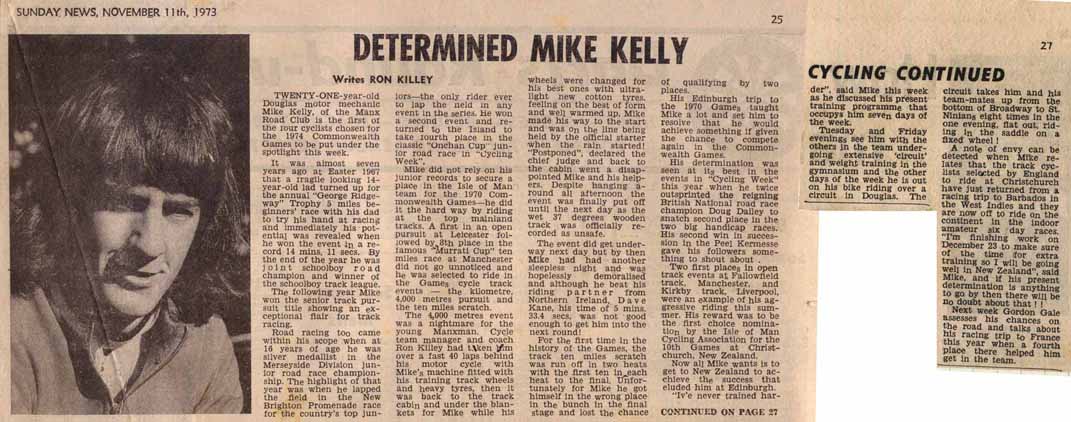
|
Isle of Man Sunday Times, 11 November 1973
Text: Determined Mike Kelly
Writes Ron Killey
Twenty-One-year-old Douglas motor mechanic Mike Kelly, of the Manx Road Club is the first of the four cyclists
chosen for the 1974 Commonwealth Games to be put under the spotlight this week.
It was almost seven years ago at Easter 1967 that a fragile looking 14-year-old lad turned up for the annual
"George Ridgeway" Trophy 5 miles beginners' race with his dad to try his hand at racing and immediately his
potential was revealed when he won the event in a record 14 mins. 11 secs. By the end of the year he was joint
schoolboy road champion and winner of the schoolboy track league.
The following year Mike won the senior track pursuit title showing an exceptional flair for track racing.
Road racing too came within his scope when at 16 years of age he was silver medallist in the Merseyside Division
junior road race championship. The highlight of that year was when he lapped the field in the New Brighton
Promenade race for the country's top juniors - the only rider ever to lap the field in any event in the series.
He won a second event and returned to the Island to take fourth place in the classic "Onchan Cup" junior road
race in "Cycling Week".
Mike did not rely on his junior records to secure a place in the Isle of Man team for the 1970 Commonwealth Games
- he did it the hard way by riding at the top mainland tracks. A first in an open pursuit at Leicester followed
by 8th place in the famous "Murrati Cup" ten miles race at Manchester did not go unnoticed and he was selected
to ride in the Games cycle track events - the kilometre, 4,000 metres pursuit and the ten miles scratch.
The 4,000 metres event was a nightmare for the young Manxman. Cycle team manager and coach Ron Killey had taken
him over a fast 40 laps behind his motor cycle with Mike's machine fitted with his training track wheels and
heavy tyres, then it was back to the track cabin and under blankets for Mike while his wheels were changed for
his best ones with ultra-light new cotton tyres. Feeling on the best of form and well warmed up, Mike made his
way to the start and was on the line being held by the official starter when the rain started! "Postponed",
declared the chief judge and back to the cabin went a disappointed Mike and his helpers. Despite hanging around
all afternoon the event was finally put off until the next day as the wet 37 degrees wooden track was officially
recorded as unsafe.
The event did get underway next day but by then Mike had had another sleepless night and was hopelessly
demoralised and although he beat his riding partner from Northern Ireland, Dave Kane, his time of 5 mins.
33.4 secs, was not good enough to get him into the next round!
For the first time in the history of the Games, the track ten miles scratch was run off in two heats with the
first ten in each heat to the final. Unfortunately for Mike he got himself in the wrong place in the bunch in
the final stage and lost the chance of qualifying by two places.
His Edinburgh trip to the 1970 Games taught Mike a lot and set him to resolve that he would achieve something
if given the chance to compete again in the Commonwealth Games.
His determination was seen at its best in the events in "Cycling Week" this year when he twice outsprinted the
reigning British National road race champion Doug Dailey to snatch second place in the two big handicap races.
His second win in succession in the Peel Kermesse gave his followers something to shout about.
Two first places in open track events at Fallowfield track, Manchester, and Kirkby track, Liverpool, were an
example of his aggressive riding this summer. His reward was to be the first choice nomination by the
Isle of Man Cycling Association for the 10th Games at Christchurch, New Zealand.
Now all Mike wants is to get to New Zealand to achieve the success that eluded him in Edinburgh.
"Iv'e [sic] never trained har-
Continued on Page 27
der", said Mike this week as he discussed his present training programme that occupys [sic] him seven days
of the week.
Tuesday and Friday evenings see him with the others in the team undergoing extensive 'circiut' and weight training
in the gymnasium and the other days of the week he is out on his bike riding over a circiut in Douglas. The
circuit takes him and his team-mates up from the bottom of Broadway to St. Ninians eight times in the one
evening, flat out, riding in the saddle on a fixed wheel!
A note of envy can be detected when Mike relates that the track cyclists selected by England to ride at
Christchurch have just returned from a racing trip to Barbadosin the West Indies and they are now off to ride on
the continent in the indoor amateur six day races. "I'm finishing work on December 23 to make sure of the time
for extra training so I will be going well in New Zealand", said Mike, and if his present determination is anything
to go by then there will be no doubt about that!!
Next week Gordon Gale assesses his chances on the road and talks about his racing trip to France this year when
a fourth place there helped him get in the team.
Picture note: Mike Kelly
|
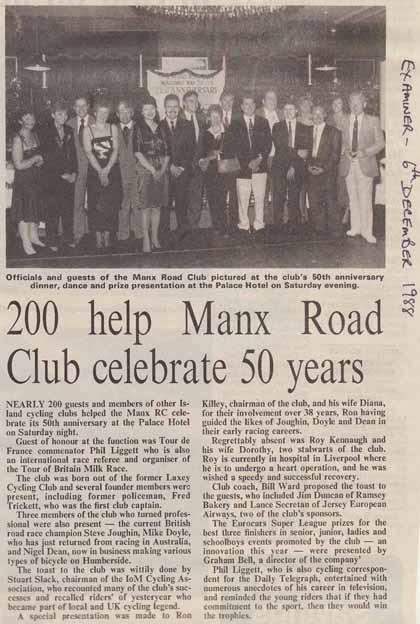
|
Isle of Man Examiner, 6 December 1988
Text: 200 help Manx Road Club celebrate 50 years.
Nearly 200 guests and members of other Island cycling clubs helped the Manx RC celebrate its 50th anniversary
at the Palace Hotel on Saturday night.
Guest of honour at the function was Tour de France commenator [sic] Phil Liggett who is also an international
race referee and organiser of the Tour of Britain Milk Race.
The club was born out of the former Laxey Cycling Club and several founding members were present, including former
policeman, Fred Trickett, who was the first club captain.
Three members of the club who turned professional were also present - the current British road race champion
Steve Joughin, Mike Doyle, who has just returned from racing in Australia, and Nigel Dean, now in business making
various types of bicycle on Humberside.
The toast to the club was wittily done by Stuart Slack, chairman of the IoM Cycling Association, who recounted many
of the club's successes and recalled riders' of yesteryear who became part of local and UK cycling legend.
A special presentation was made to Ron Killey, chairman of the club, and his wife Diana, for their involvement
over 38 years, Ron having guided the likes of Joughin, Doyle and Dean in their early racing careers.
Regrettably absent was Roy Kennaugh and his wife Dorothy, two stalwarts of the club. Roy is currently in hospital
in Liverpool where he is to undergo a heart operation, and he was wished a speedy and successful recovery.
Club coach, Bill Ward proposed the toast to the guests, who included Jim Duncan of Ramsey Bakery and Lance Secretan
of Jersey EUropean Airways, two of the club's sponsors.
The Eurocars Super League prizes for the best three finishers in senior, junior, ladies and schoolboys events
promoted by the club - an innovation this year - were presented by Graham Bell, a director of the company'
Phil Liggett, who is also cycling correspondent for the Daily Telegraph, entertained with numerous anecdotes of his
career in television, and reminded the young rider that if they had commitment to the sport, then they would win
the trophies.
Picture caption: Officials and guests of the Manx Road Club pictured at the club's 50th anniversary dinner,
dance and prize presentation at the Palace Hotel on Saturday evening.
|
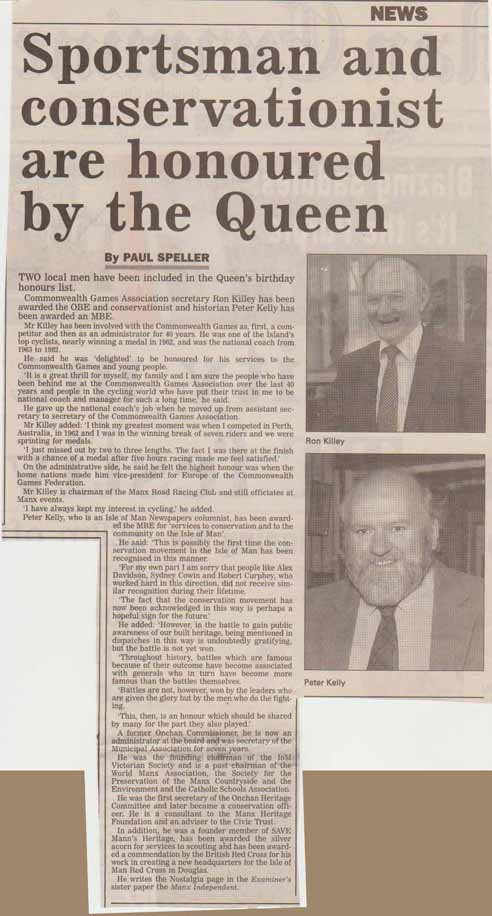
|
Isle of Man Examiner, 16 June 1998
Text: Sportsman and conservationist are honored by the Queen.
By Paul Speller.
Two local men have been included in the Queen's birthday honors list.
Commonwealth Games Association secretary Ron Killey has been awarded the OBE and conservationist and historian
Peter Kelly has been awarded an MBE.
Mr Killey has been involved with the Commonwealth Games as, first, a competitor and then as an adminstrator for
40 years. He was one of the Island's top cyclists, nearly winning a medal in 1962, and was the national coach from
1963 to 1982.
He said he was 'delighted' to be honoured for his services to the Commonwealth Games and young people.
'It is a great thrill for myself, my family and I am sure the people who have been behind me at the Commonwealth
Games Association over the last 40 years and people in the cycling world who have put their trust in me to be
national coach and manager for such a long time,' he said.
He gave up the national coach's job when he moved up from assistant secretary to secretary of the Commonwealth
Games Association.
Mr Killey added: 'I think my greatest moment was when I competed in Perth, Australia, in 1962 and I was in the
winning break of seven riders and we were sprinting for medals.
'I just missed out by two to three lengths. The fact I was there at the finish with a chance of a medal after five
hours racing made me feel satisfied.'
On the administrative side, he said he felt the highest honour was when the home nations made him vice-preseident
for Europe of the Commonwealth Games Federation.
Mr Killey is chairman of the Manx Road Racing Club and still officiates at Manx events.
'I have always kept my interest in cycling,' he added.
The remainder of the article is a summary of Peter Kelly and his 'services to conservation and to the community
on the Isle of Man'.
|
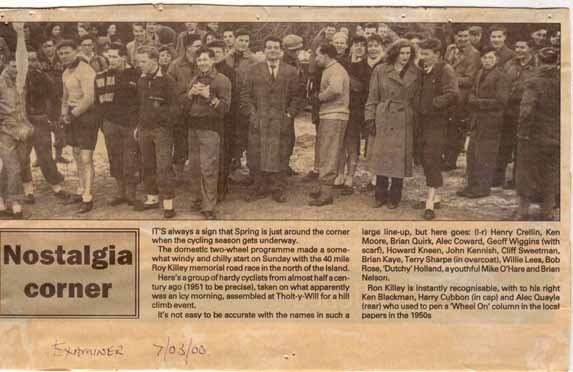
|
Isle of Man Examiner, 7 March 2000
Text: Nostalgia Corner
It's always a sign that Spring is just around the corner when the cycling season gets underway.
The domestic two-wheel programme made a some-what windy and chilly start on Sunday with the 40 mile Roy Killey
memorial road race in the north of the Island.
Here's a group of hardy cyclists from almost half a century go (1951 to be precise), taken on what apparently was
an icy morning, assembled at Tholt-y-Will for a hill climb event.
It's not easy to be accurate with the names in such a large line-up, but here goes: (l-r) Henry Crellin, Ken Moore,
Brian Quirk, Alec Coward, Geoff Wiggins (with scarf), Howard Kneen, John Kennish, Cliff Sweetman, Brian Kaye,
Terry Sharpe (in overcoat), Willie Lees, Bob Rose, 'Dutchy' Holland, a youthful Mike O'Hare and Brian Nelson.
Ron Killey is instantly recognisable, with to his right Ken Blackman, Harry Cubbon (in cap) and Alec Quayle (rear)
who used to pen a 'Wheel On' column in the local papers in the 1950s
|
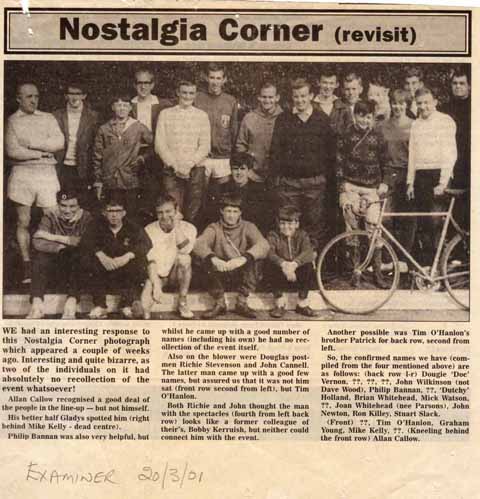
|
Isle of Man Examiner, 20 March 2001
Text: Nostalgia Corner (revisit)
We had an interesting response to this Nostalgia Corner photograph which appeared a couple of weeks ago. Interesting
and quite bizarre, as two of the individuals on it had absolutely no recollection of the event whatsoever!
Allan Callow recognised a good deal of the people in the line-up - but not himself.
His better half Gladys spotted him (right behind Mike Kelly - dead center).
Philip Bannan was also very helpful, but whilst he came up with a good number of names (including his own) he had no
recollection of the event itself.
Also on the blower were Douglas postmen Richie Stevenson and John Cannell. The latter man came up with a good few
names, but assured us that it was not him sat (front row second from left), but Tim O'Hanlon.
Both Richie and John thought the man with the spectacles (fourth from left back row) looks like a former colleague
of their's, Bobby Kerruish, but neither could connect him with the event.
Another possible was Tim O'Hanlon's brother Patrick for back row, second from left.
So, the confirmed names we have (compiled from the four mentioned above) are as follows: (back row l-r)
Dougie 'Doc' Vernon, ??, ??, ??, John Wilkinson (not Dave Wood), Philip Bannan, ??, 'Dutchy' Holland, Brian Whitehead,
Mick Watson, ??, Joan Whitehead (nee Parsons), John Newton, Ron Killey, Stuart Slack.
(Front) ??, Tim O'Hanlon, Graham Young, Mike Kelly, ??. (Kneeling behind the front row) Allan Callow.
|
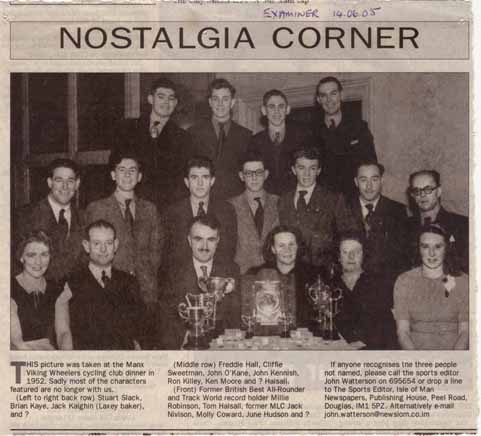
|
Isle of Man Examiner, 14 June 2005
Text: Nostalgia Corner
This picture was taken at the Manx Viking Wheelers cycling club dinner in 1952. Sadly most of the characters featured
are no longer with us.
(Left to right back row) Stuart Slack, Brian Kaye, Jack Kaighin (Laxey baker), and ?
(Middle row) Freddie Hall, Cliffie Sweetman, John O'Kane, John Kennish, Ron Killey, Ken Moore and ? Halsall.
(Front) Former British Best All-Rounder and Track World record holder Millie Robinson, Tom Halsall, former MLC
Jack Nivison, Molly Coward, June Hudson and ?
If anyone recognises the three people not named, please call the sports editor John Watterson on 695654 or drop a
line to The Sports Editor, Isle of Man Newspapers, Publishing House, Peel Road, Douglas, IM1 5PZ. Alternatively
e-mail john.watterson@newsiom.co.im
|
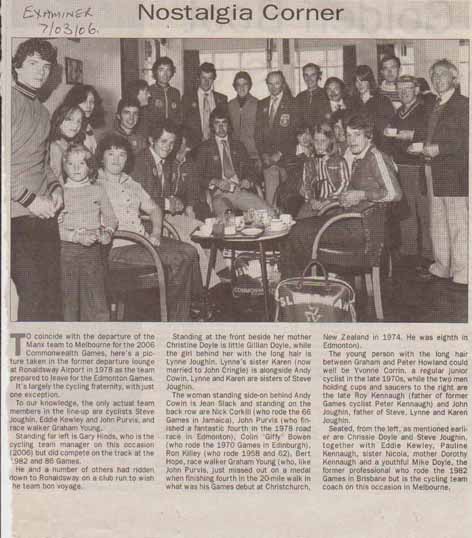
|
Isle of Man Examiner, 7 March 2006
Text: To coincide with the departure of the Manx team to Melbourne for the 2006 Commonwealth Games,
here's a picture taken in the former departure lounge at Ronaldsway Airport in 1978 as the team prepared to leave
for the Edmonton Games.
It's largely the cycling fraternity, with just one exception.
To our knowledge, the only actual team members in the line-up are cyclists Steve Joughin, Eddie Kewley
and John Purvis, and race walker Graham Young.
Standing far left is Gary Hinds, who is cycling team manager on this occasion (2006) but did compete on the track
at the 1982 and 86 games.
He and a number of others had ridden down to Ronaldsway on a club run to wish the team bon voyage.
Standing at the front beside her mother Christine Doyle is little Gillian Doyle, while the girl behind her with the
long hair is Lynne Joughin, Lynne's sister Karen (now married to John Cringle) is alongside Andy Cowin.
Lynne and Karen are sisters of Steve Joughin.
The woman standing side-on behind Andy Cowin is Jean Slack and standing on the back row are Nick Corkill (who
rode the 66 Games in Jaimaca), John Purvis (who finished a fantastic fourth in the 1978 road race in Edmonton),
Colin 'Giffy' Bowen (who rode the 1970 Games in Edmonton), Ron Killey (who rode 1958 and 62), Bert Hope, race walker
Grahan Young (who, like John Purvis, Just missed out on a medal when finishing fourth in the 20-mile walk in what
was his Games debut at Christchurch, New Zealand in 1974. He was eighth in Edmonton).
The young person with the long hair between Graham and Peter Howland could well be Yvonne Corrin, a regular junior
cyclist in the late 1970s, while the two men holding cups and saucers to the right are the late Roy Kennaugh
(father of former Games cyclist Peter Kennaugh) and John Joughin, father of Steve, Lynne and Karen Joughin.
Seated, from the left, as mentioned ealier are Chrissie Doyle and Steve Joughin, together with Eddie Kewley,
Pauline Kennaugh, sister Nicola, mother Dorothy Kennaugh and a youthful Mike Doyle, the former professional who
rode the 1982 Games in Brisbane but is the cycling team coach on this occasion in Melbourne.
|
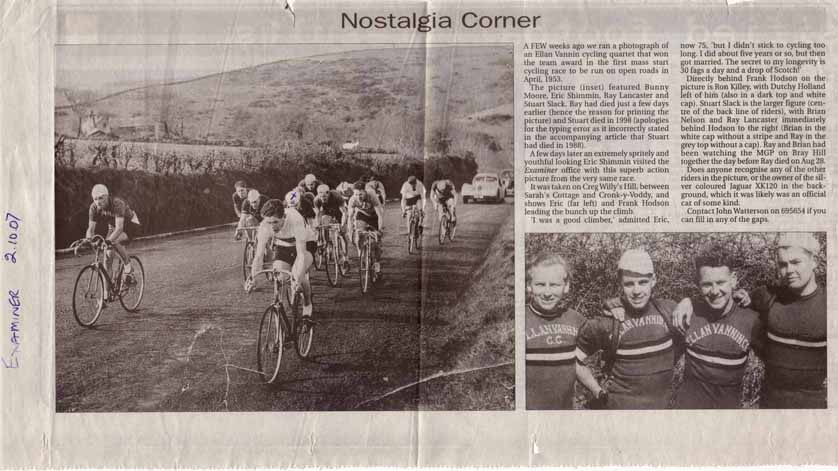
|
Isle of Man Examiner, 2 October 2007
Text: Nostalgia Corner
A few weeks ago we ran a photograph of an Ellan Vannin cycling quartet that won the team award in the first mass start
cycling race to be run on open roads in April, 1953.
The picture (inset) featured Bunny Moore, Eric Shimmin, Ray Lancaster and Stuart Slack. Ray had died just a few days
earlier (hence the reason for printing the picture) and Stuart died in 1998 (apologies for the typing error as it
incorrectly stated in the accompanying article that Stuart had died in 1988).
A few days later an extremely spritely and youthful looking Eric Shimmin visited the Examiner office with this supurb
action picture from the very same race.
It was taken on Creg Willy's Hill, between Sarah's Cottage and Cronk-y-Voddy, and shows Eric (far left) and Frank Hodson
leading the bunch up the climb.
'I was a good climber,' admitted Eric, now 75, 'but I didn't stick to cycling too long. I did about five years or so,
but then got married. The secret to my longevity is 30 fags a day and a drop of Scotch!'
Directly behind Frank Hodson on the picture is Ron Killey, with Dutchy Holland left of him (also in a dark top and white
cap). Stuart Slack is the larger figure (center of the back line of riders), with Brian Nelson and Ray Lancaster
immediately behind Hodson to the right (Brian in the white cap without a stripe and Ray in the grey top without a cap).
Ray and Brian had been watching the MGP on Bray Hill together the day before Ray died on Aug 28.
Does anyone recognise any of the other riders in the picture, or the owner of the silver coloured Jaguar XK120 in the
background, which it was likely was an official car of some kind.
Contact John Watterson on 695654 if you can fill in any of the gaps.
|
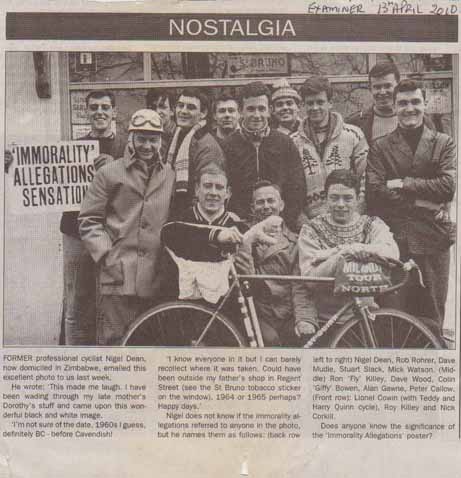
|
Isle of Man Examiner, 13 April 2010
Text: Former professional cyclist Nigel Dean, now domiciled in Zimbabwe, emailed this excellent photo to us last week.
He wrote: 'This made me laugh. I have been wading through my late mother's Dorothy's stuff and came upon this wonderful
black and white image.
'I'm not sure of the date, 1960s I guess, definately BC - before Cavendish!.
'I know everyone on it but I can barely recollect where it was taken. Could have been outside my father's shop in
Regent Street (see the St Bruno tobacco sticker on the window). 1964 or 1965 perhaps? Happy days.'
Nigel does not know if the immorality allegations referred to anyone in the photo, but he names them as follows:
(back row left to right) Nigel Dean, Rob Rohrer, Dave Mudie, Stuart Slack, Mick Watson. (Middle) Ron 'Fly' Killey,
Dave Wood, Colin 'Giffy' Bowen, Alan Gawne, Peter Callow. (Front row): Lionel Cowin (with Teddy and Harry Quinn cycle),
Roy Killey and Nick Corkill.
Does anyone know the significance of the 'Immorality Allegations' poster?.
|






















